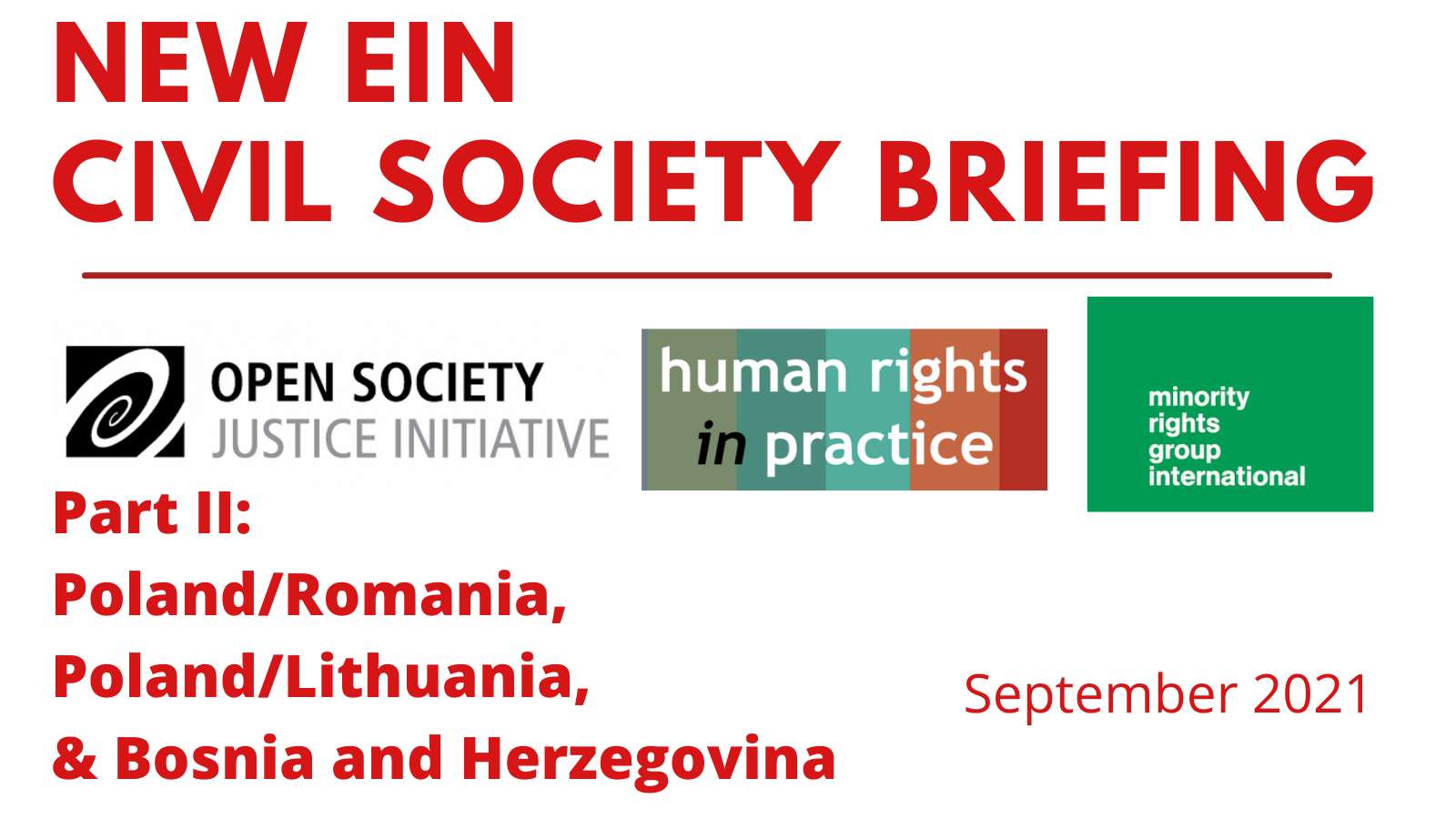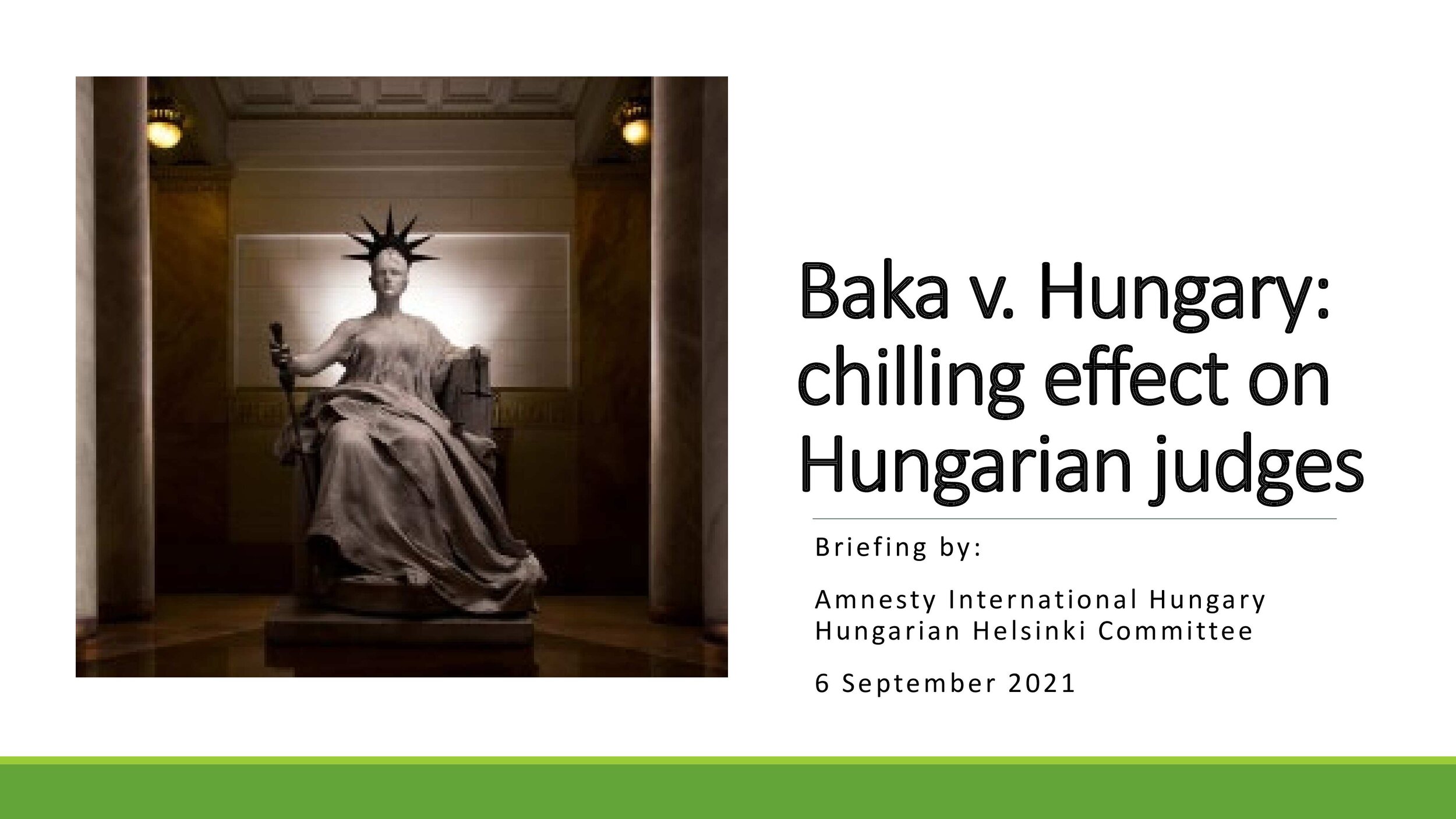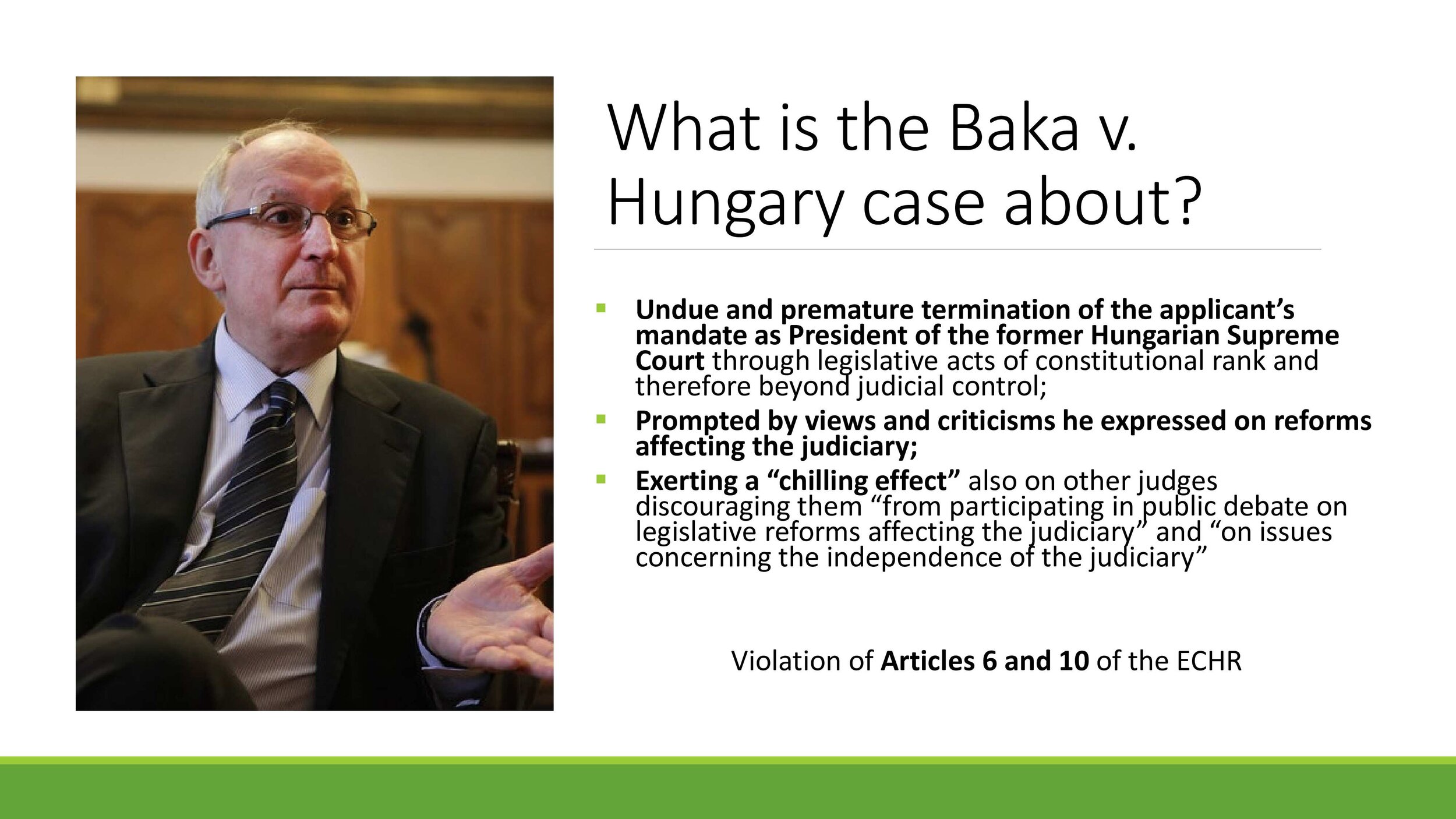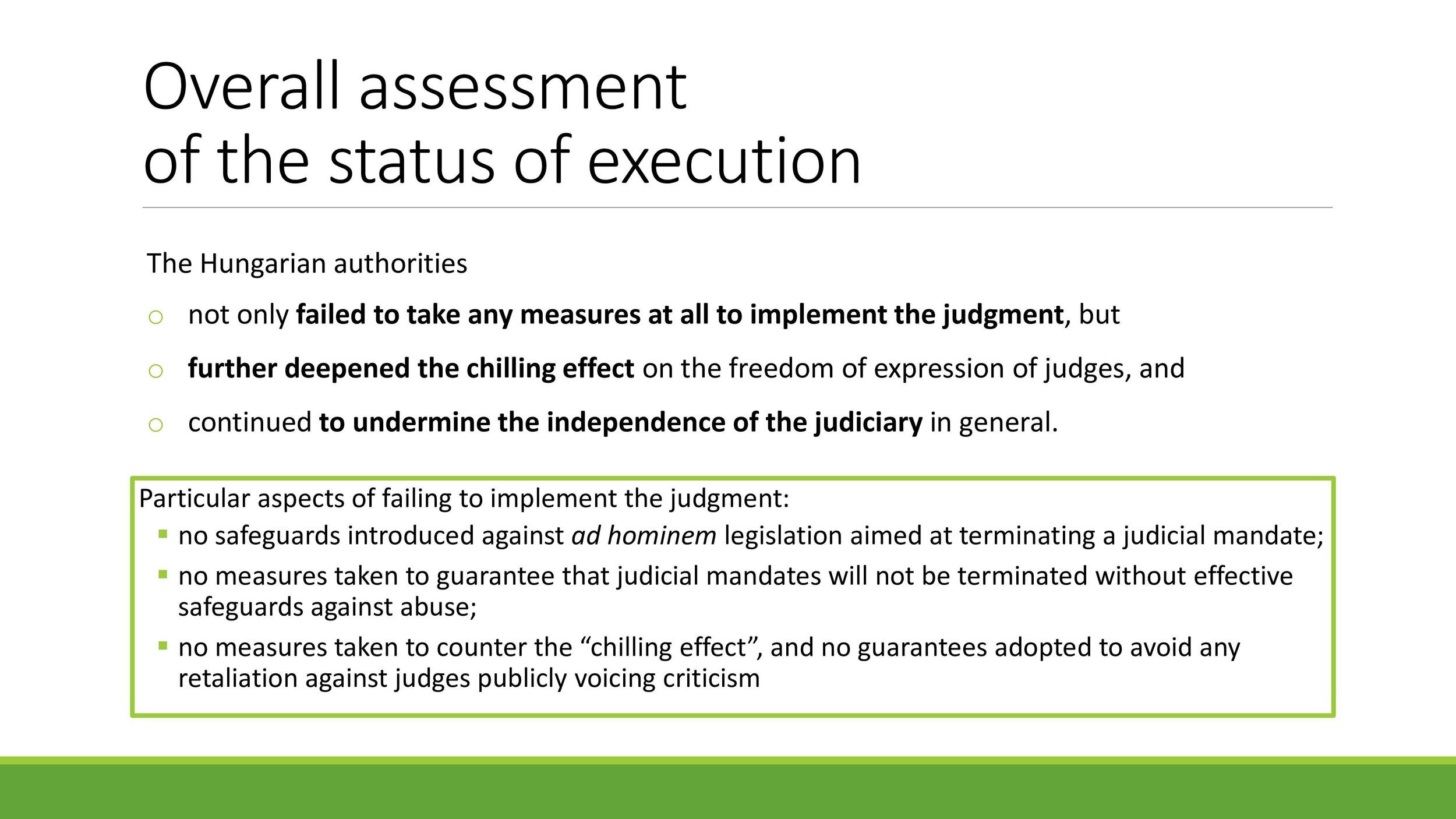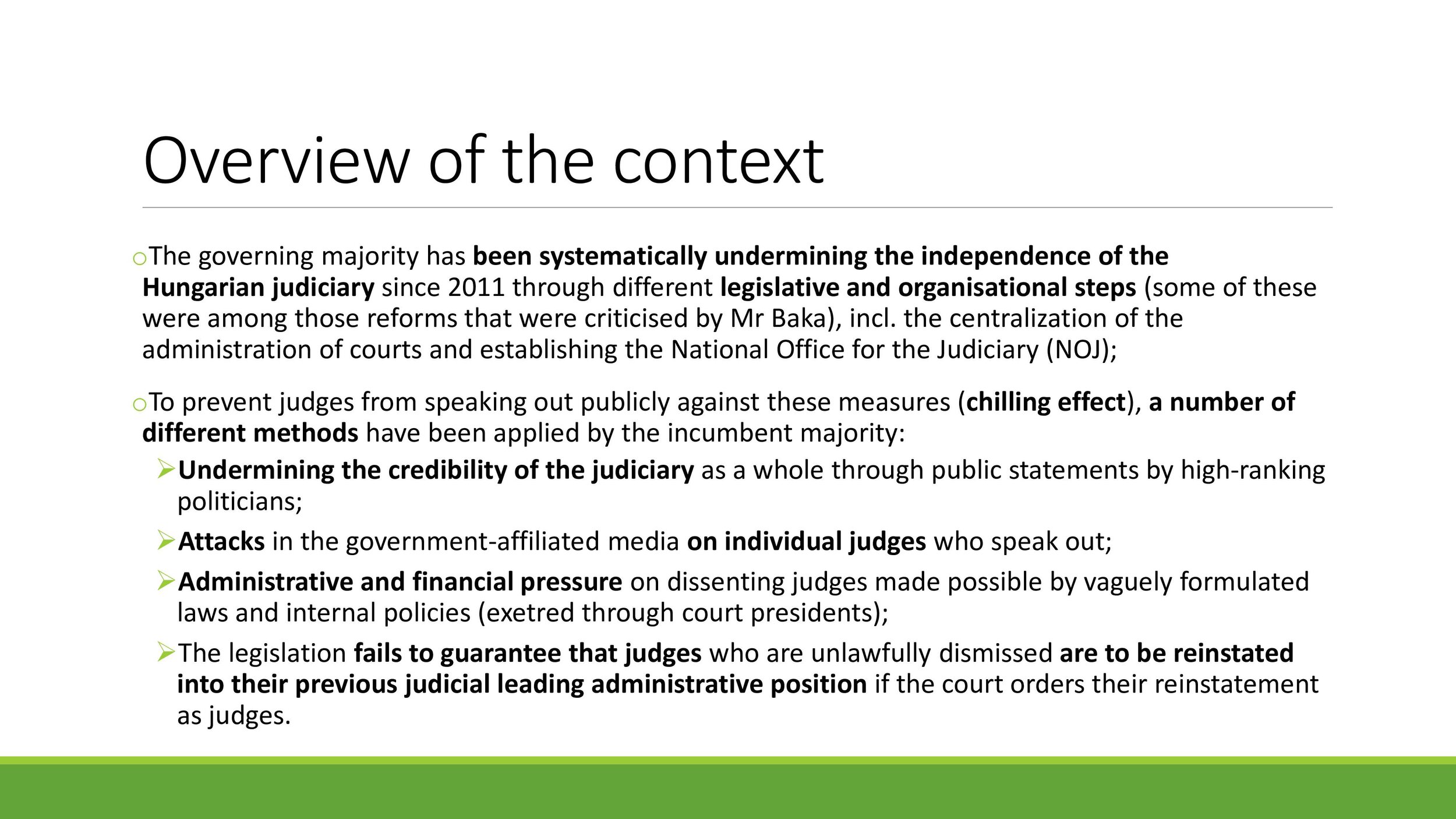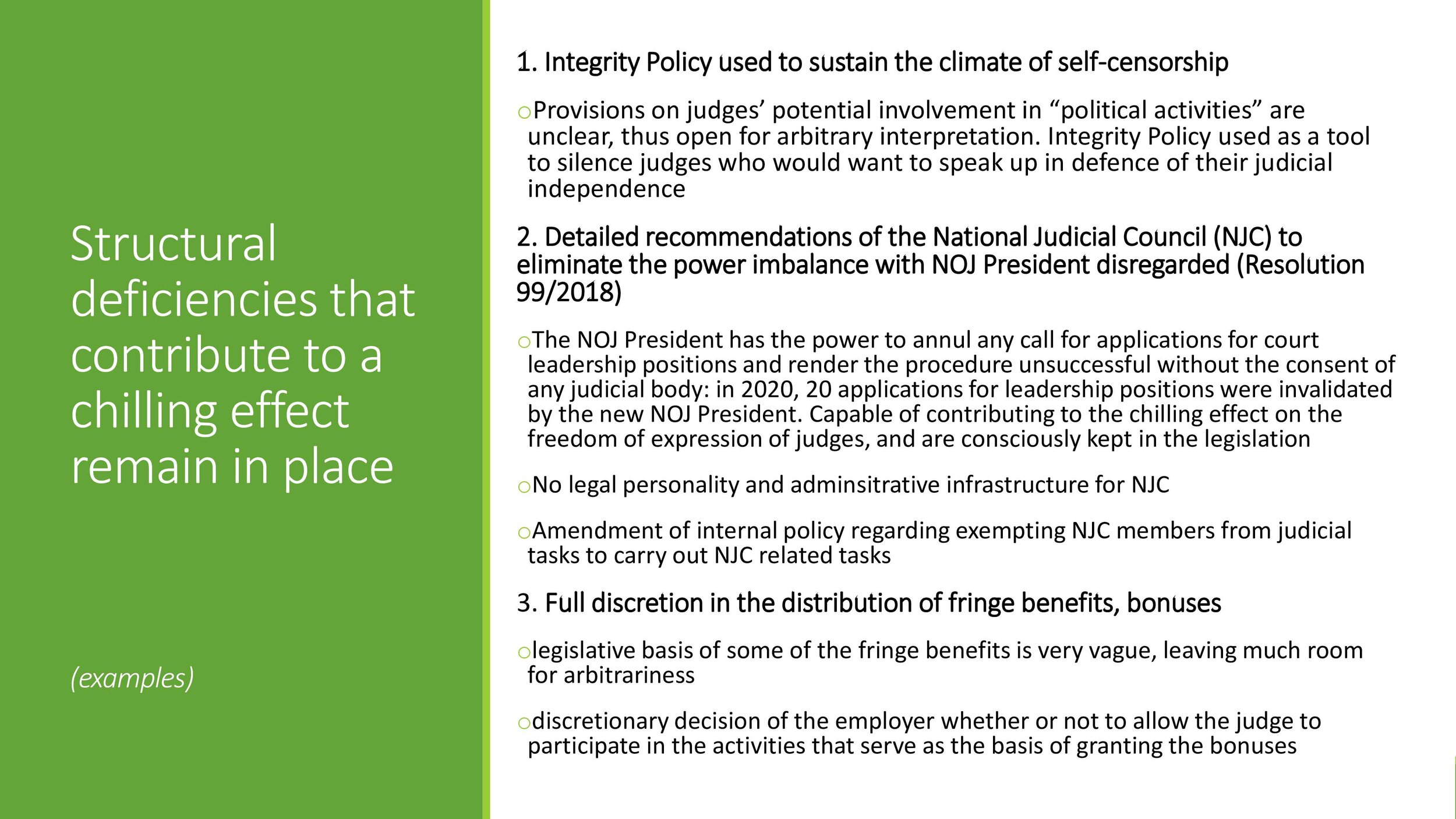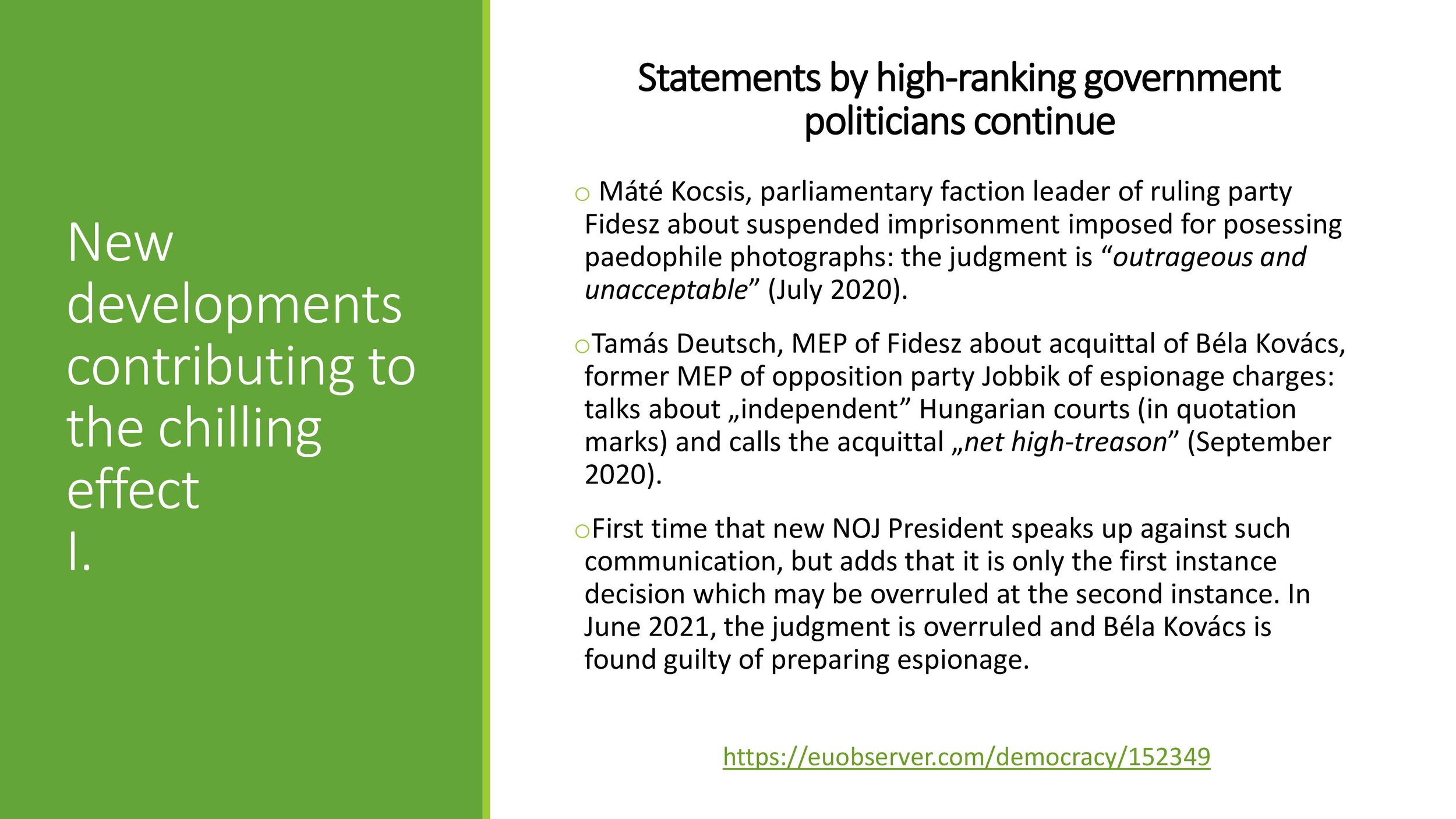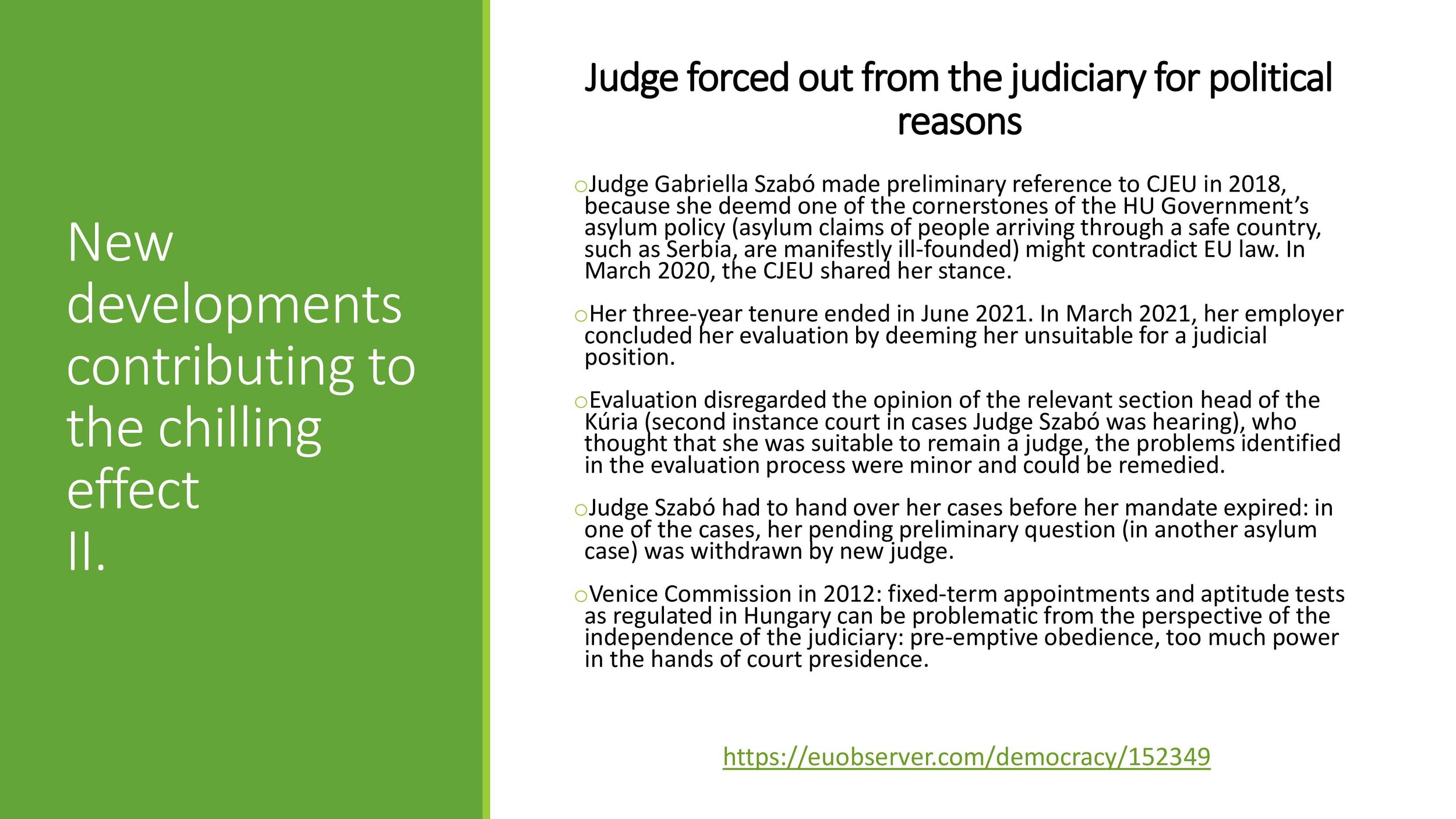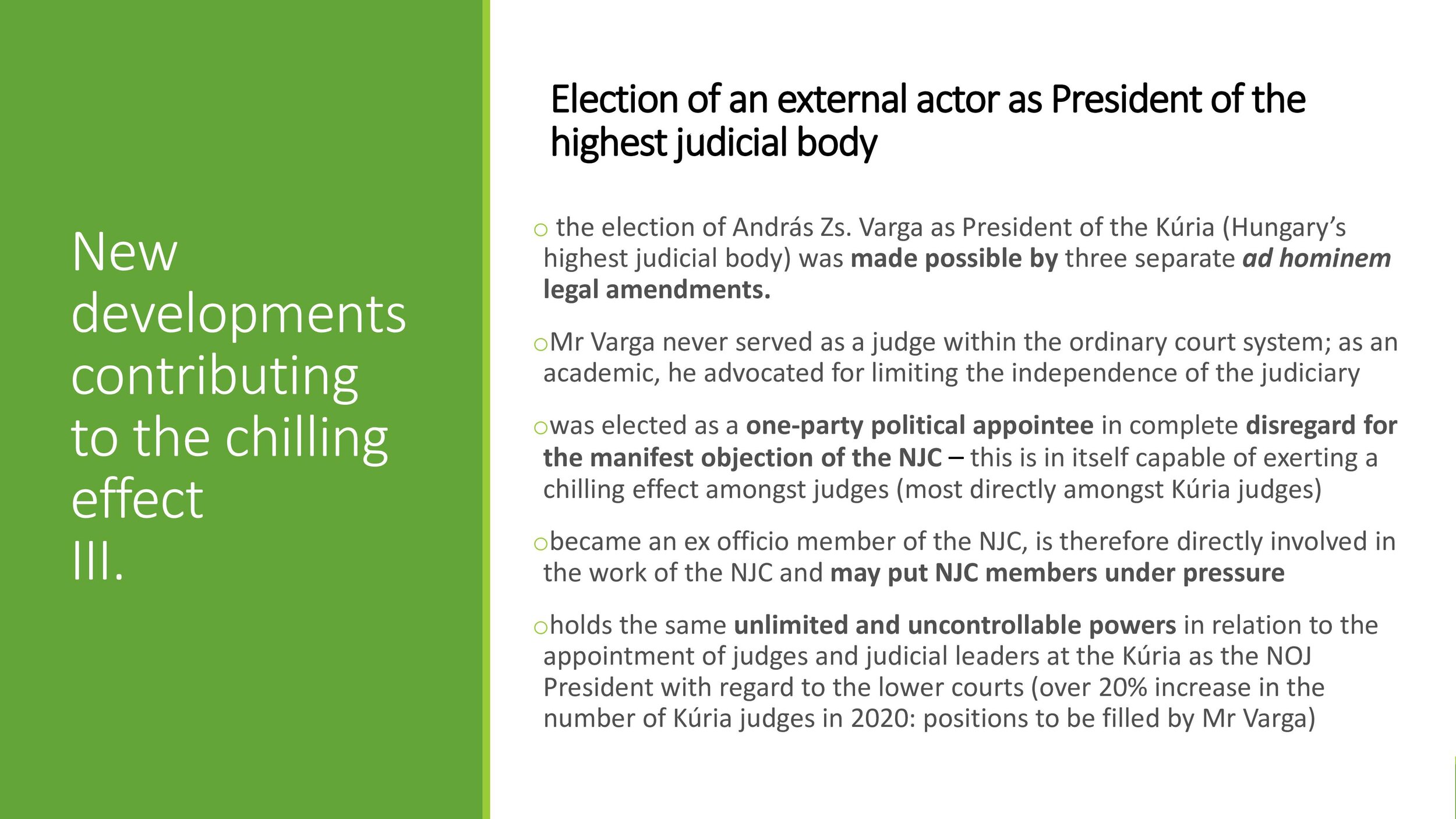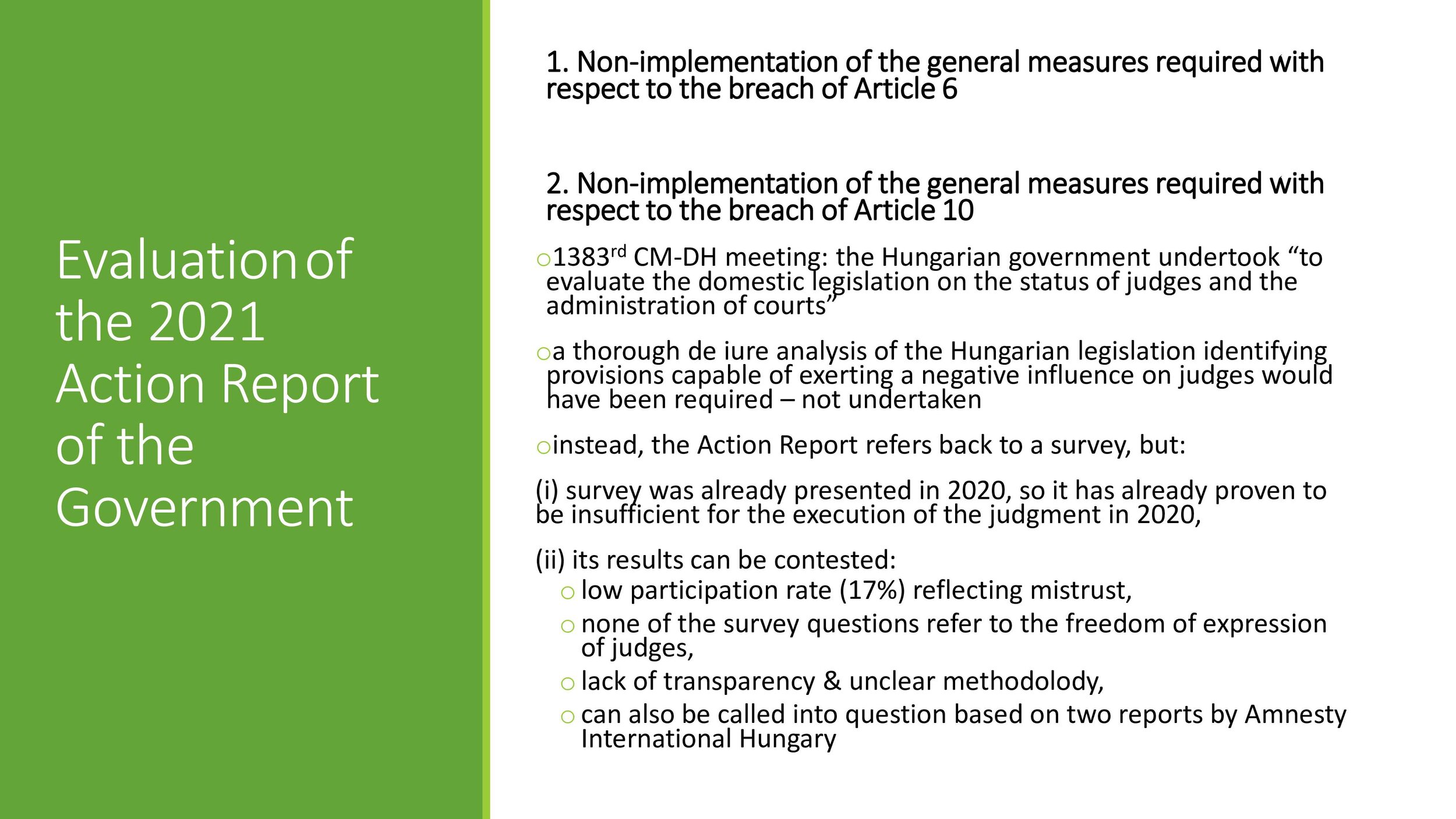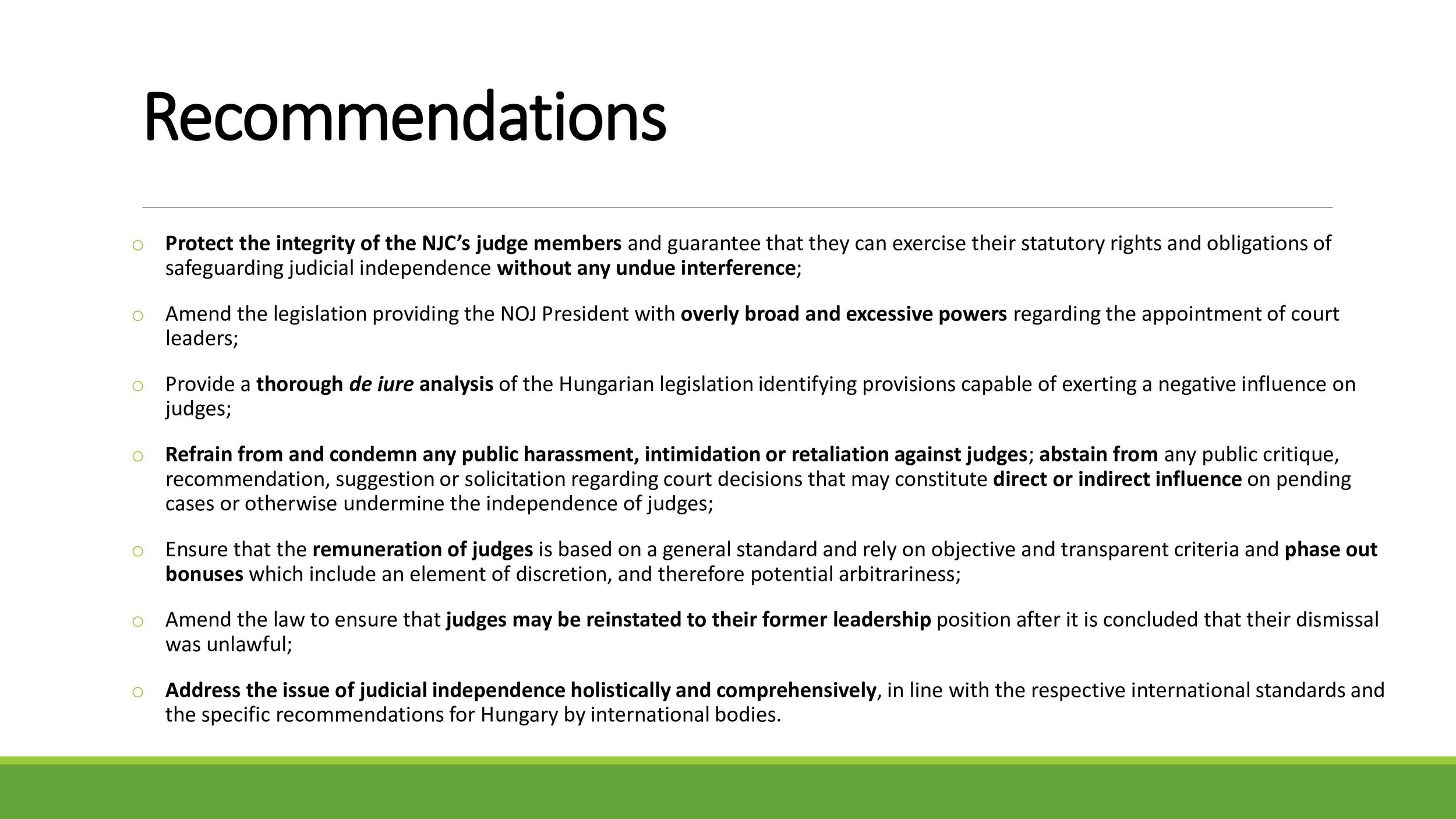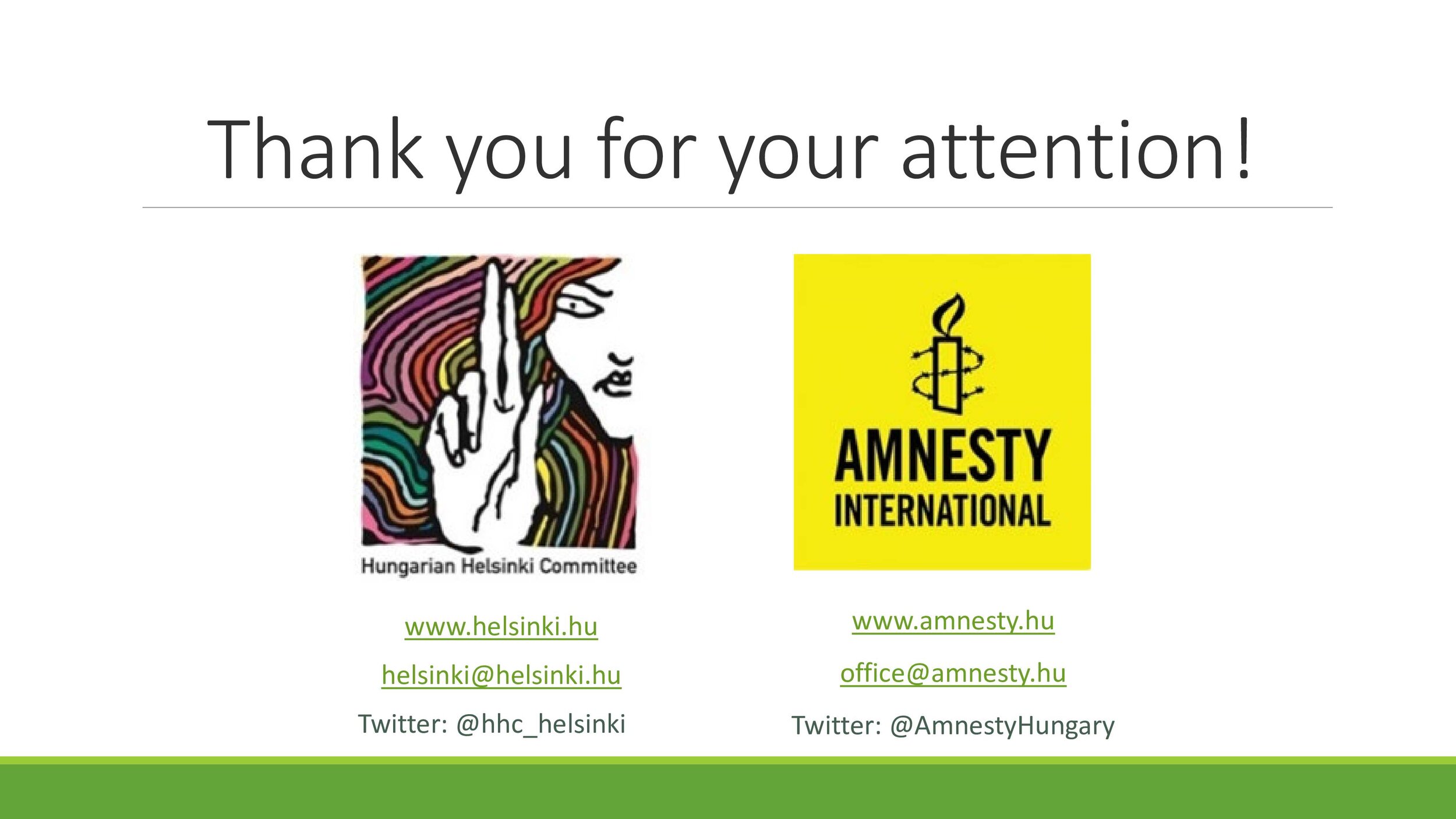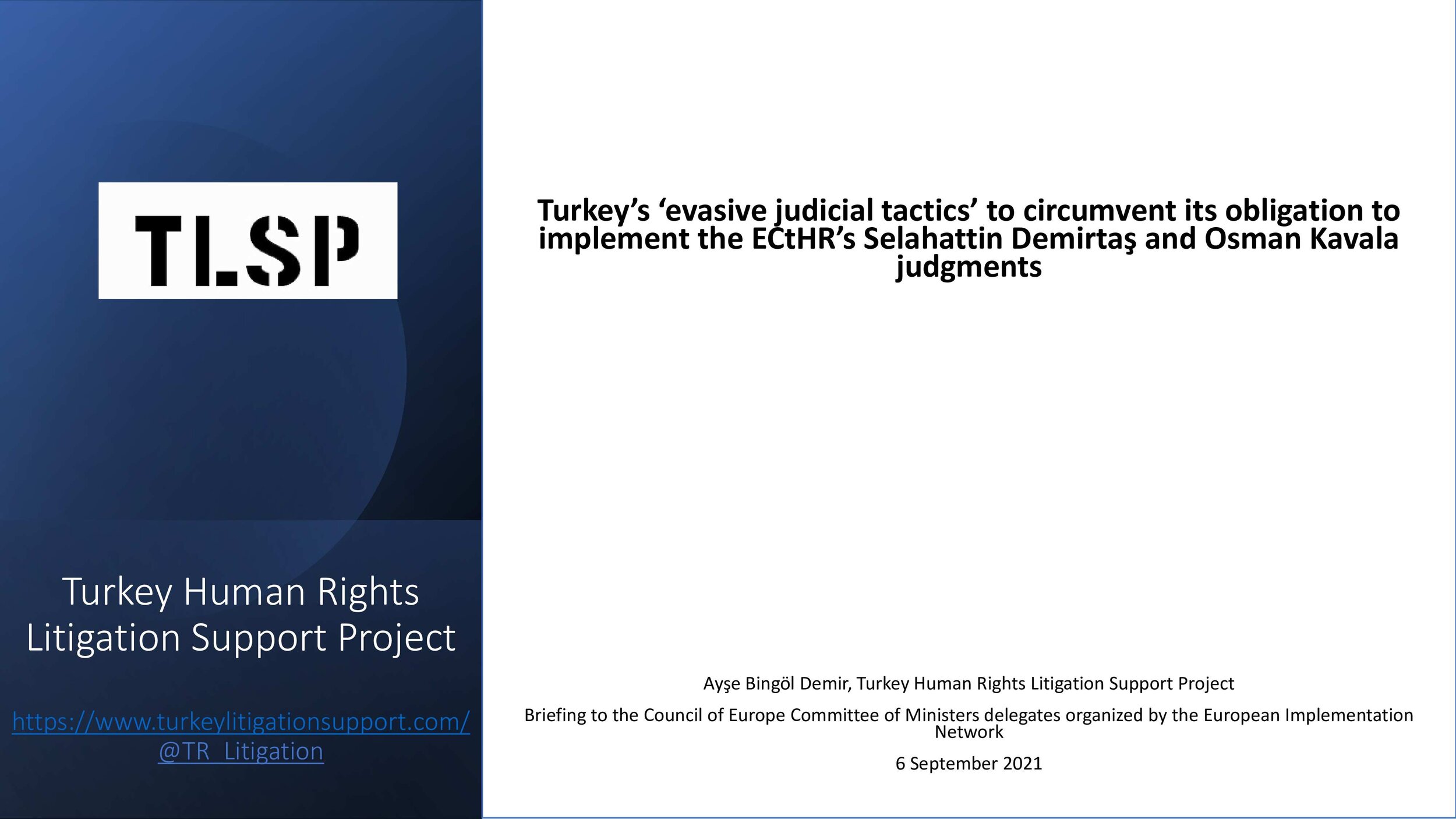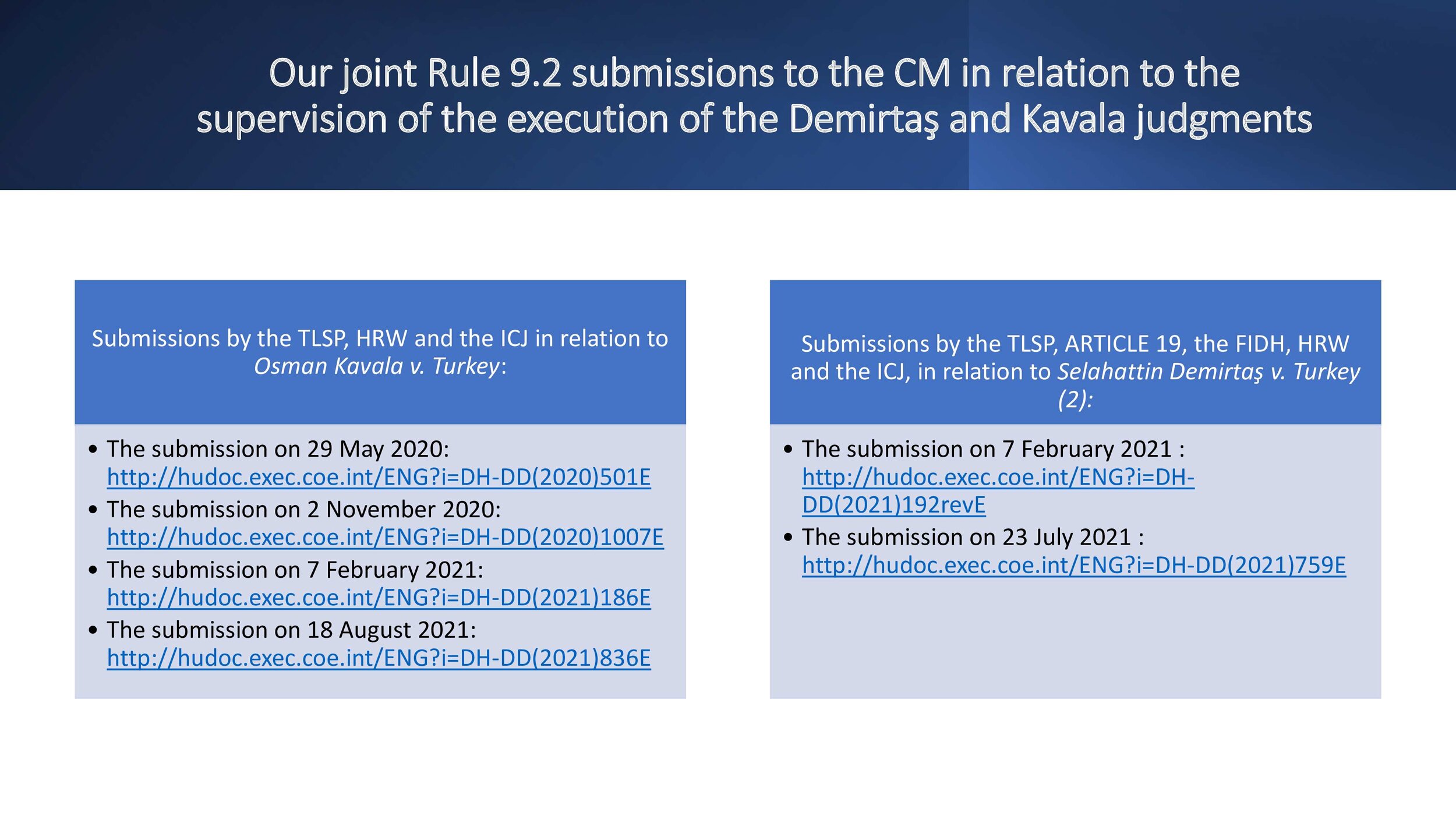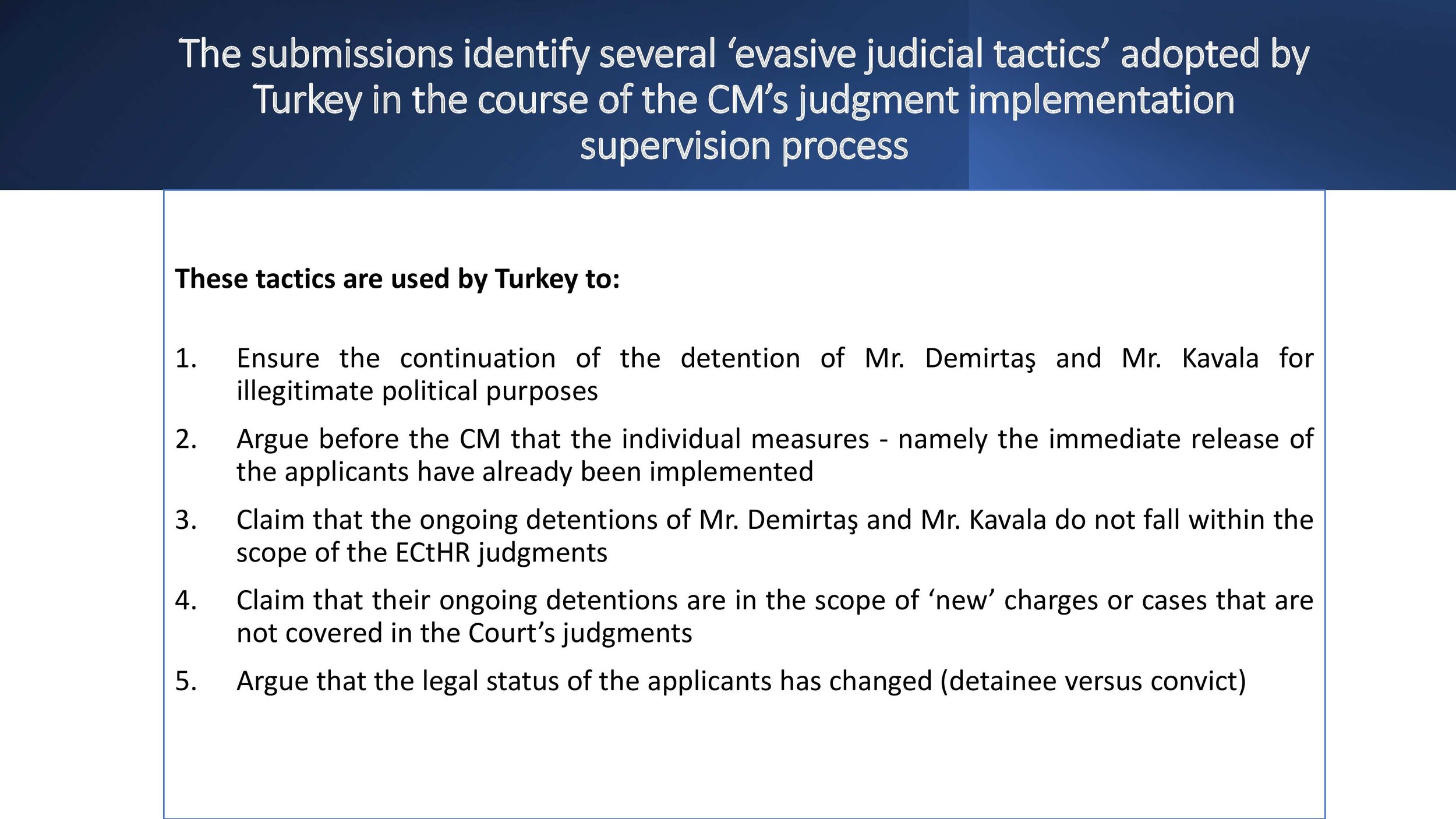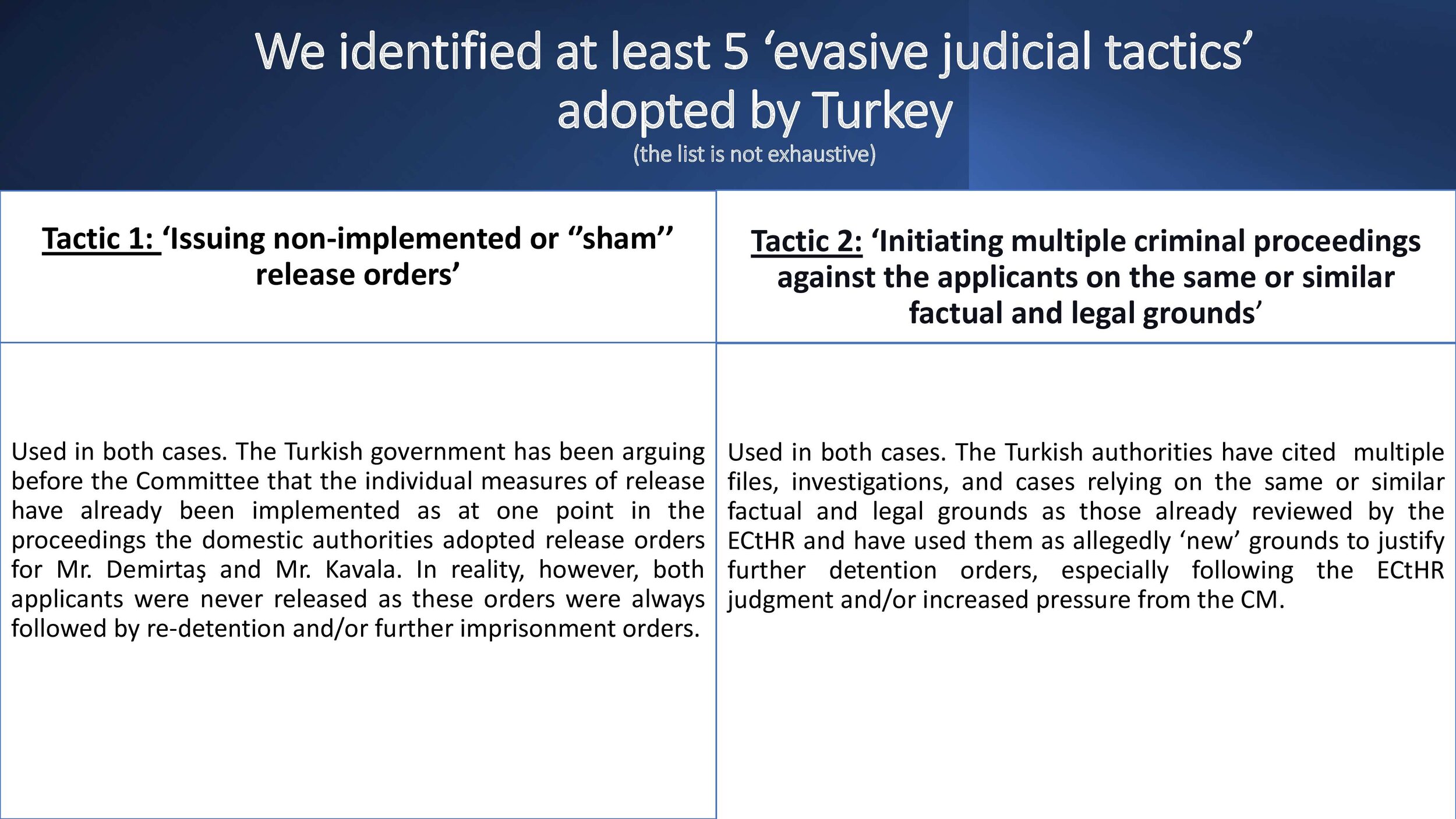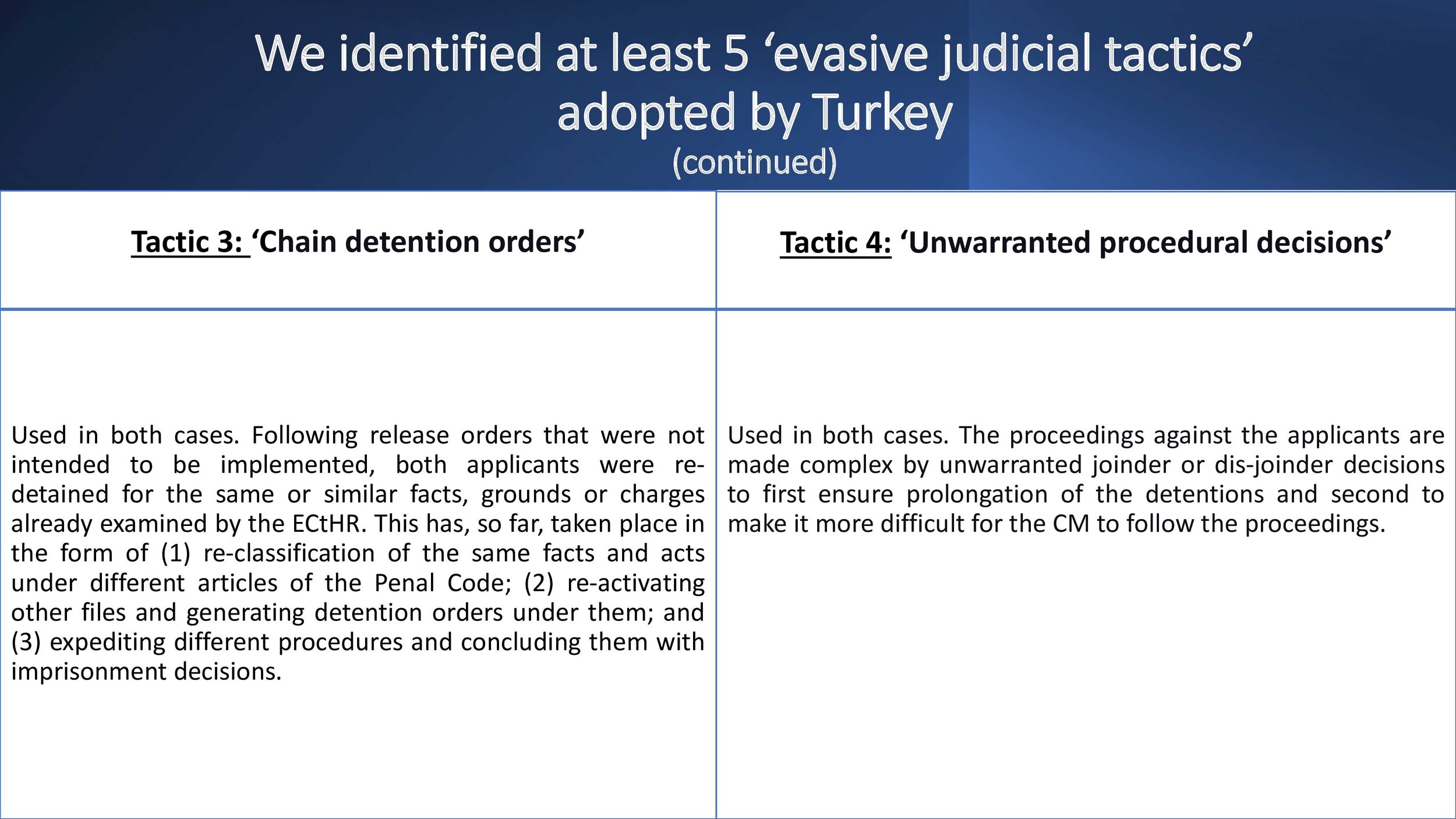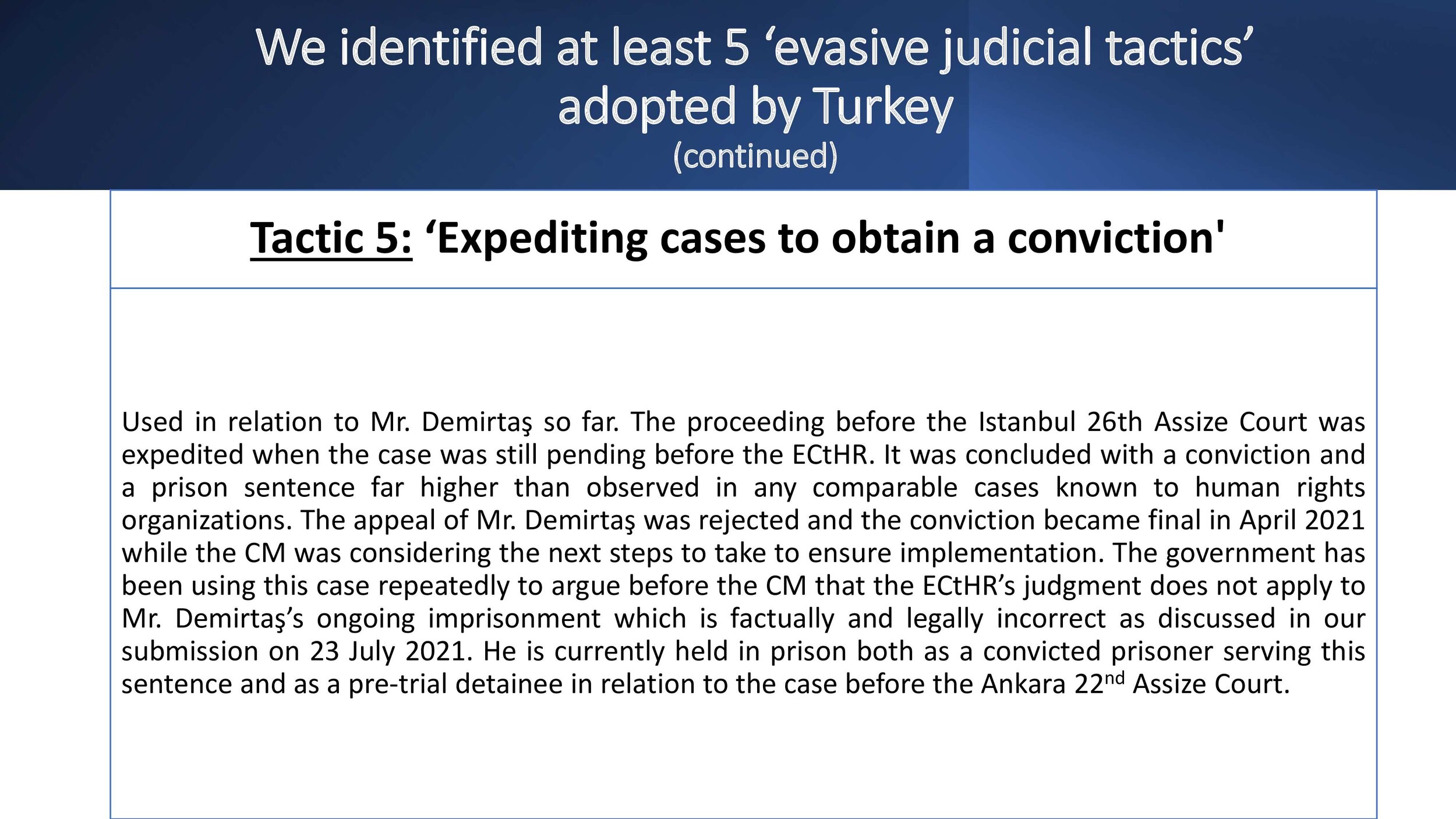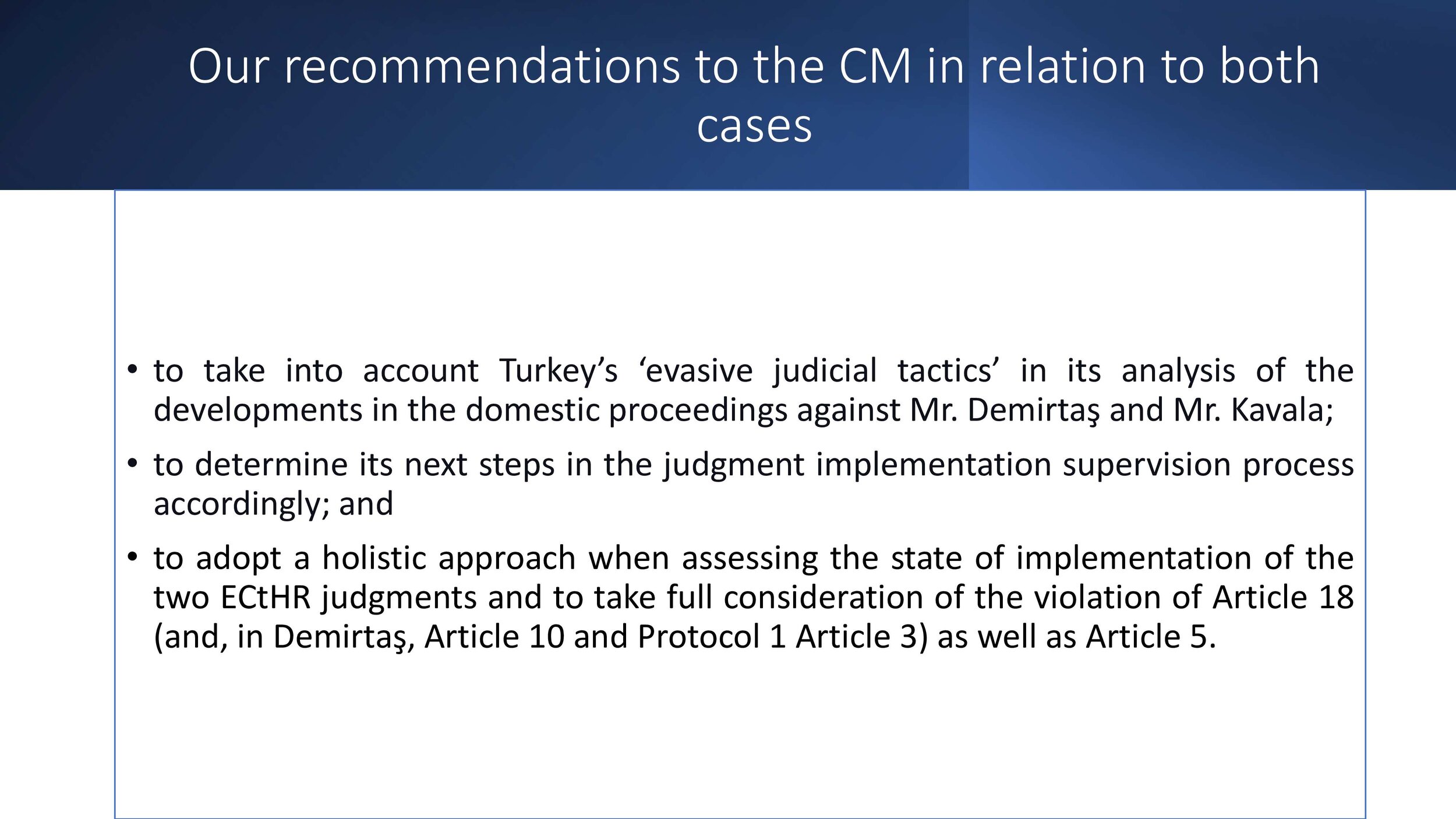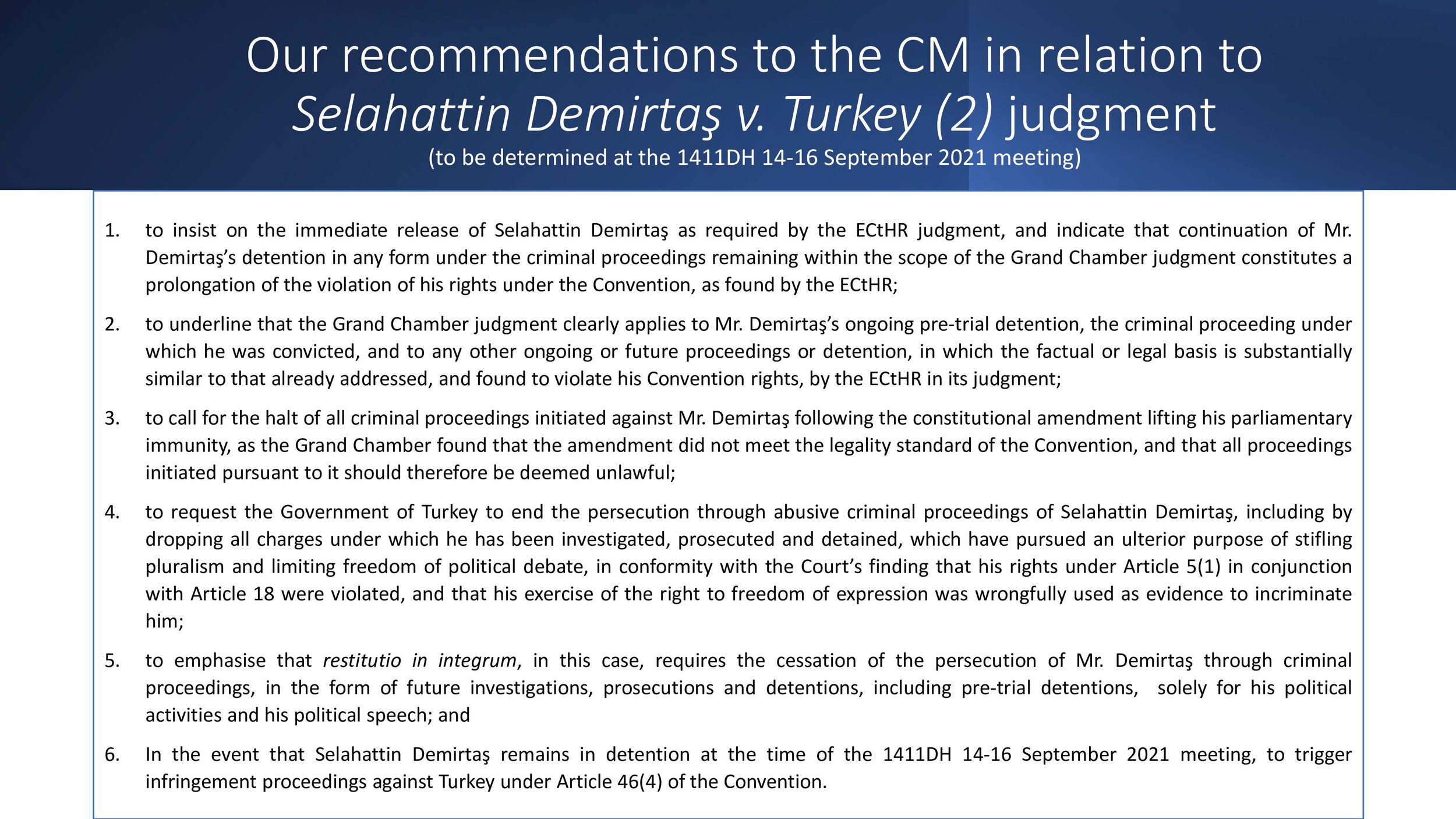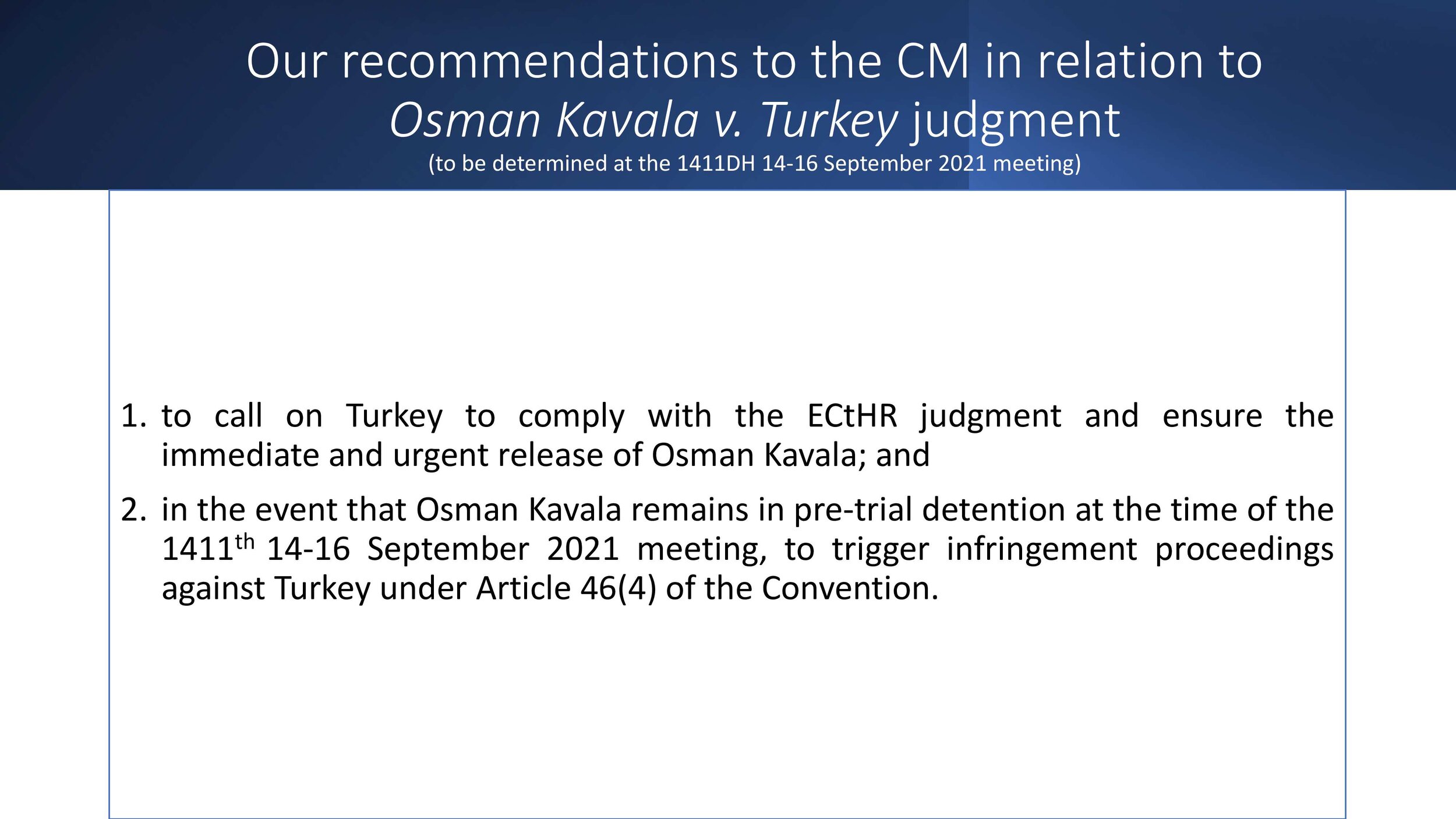EIN Civil Society Briefing September 2021: Poland, Romania, Lithuania, & Bosnia and Herzegovina (Part 2)
/On 7 September 2021, EIN held its second civil society briefing ahead of the Committee of Minister’s Human Rights Meeting on 14-16 September 2021. The event was held online due to the COVID-19 pandemic.
The second Briefing focused on the following cases:
Al Nashiri v. Poland and Al Nashiri v. Romania, which concern violations related to the secret detention and "extraordinary rendition” of the applicant, as a result, of the serious risk of further ill-treatment and conditions of detention in breach of Article 3, as well as of further secret detention. He faces a risk of capital punishment in a trial before a United States military commission, in which, according to the European Court's judgment, evidence obtained under torture might be used.
Mikołaj Pietrzak, of the Pietrzak & Sidor Law Office, counsel for Mr Al Nashiri, held a presentation on the Al Nashiri v. Poland case.
Amrit Singh, Director of Accountability, Liberty and Transparency Division at Open Society Justice Initiative, briefed the participants on Al Nashiri v. Romania.
Abu Zubaydah v. Poland and Abu Zubaydah v. Lithuania, which concern violations related to the secret detention and "extraordinary rendition” of the applicant. The applicant is exposed to continued arbitrary detention and ill-treatment at the United States Naval Base in Guantanamo Bay. Helen Duffy, counsel for Mr. Abu Zubaydah, and Director at Human Rights in Practice, presented relevant developments and recommendations on both cases to the participants.
Sejdic and Finci v. BiH, which concerns ethnic-based discrimination on account of the ineligibility of persons not affiliated with one of the “constituent peoples” (Bosniaks, Croats or Serbs) to stand for election to the House of Peoples and the Presidency. Lara Dominguez, Acting Head of Litigation at Minority Rights Group International presented the Briefing to participants.
Al Nashiri v Poland
This case concerns a number of Convention rights violations arising from the fact that the applicant was a victim of a secret “rendition” operation involving his transfer between various CIA detention facilities, including one located in Afghanistan. The European Court found it established beyond reasonable doubt that the applicant arrived in Poland on board a Central Intelligence Agency (CIA) rendition aircraft on 5 December 2002 and was detained in a CIA detention facility in Stare Kiejkuty. He was subsequently transferred out of Poland, respectively in June, and September 2003, to other CIA detention facilities and eventually to the United States Guantánamo Bay Naval Base in Cuba.
The Court found that his transfer from Poland exposed him to a real risk of a flagrant denial of justice due to the possibility he would face trial before United States’ military commissions at the Guantánamo Bay Naval Base using evidence obtained under torture. Mr. Al Nashiri was charged with capital offences before the military commissions, and the Court found that he faced a real risk of being subjected to the death penalty.
Overview of Al Nashiri Briefing
Mikolaj Pietrzak reminded the participants of the last CM Decision in the case (December 2020):
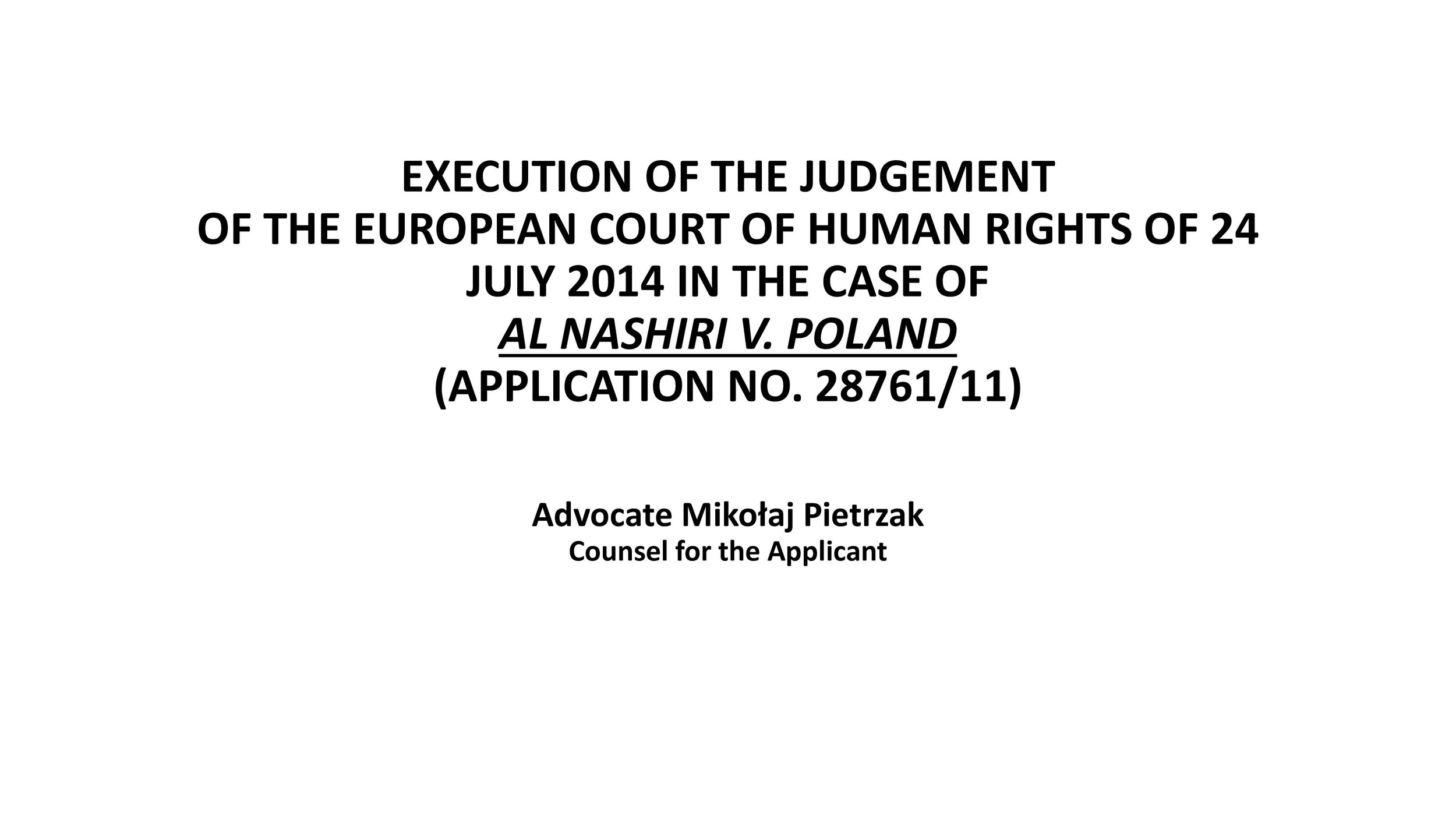
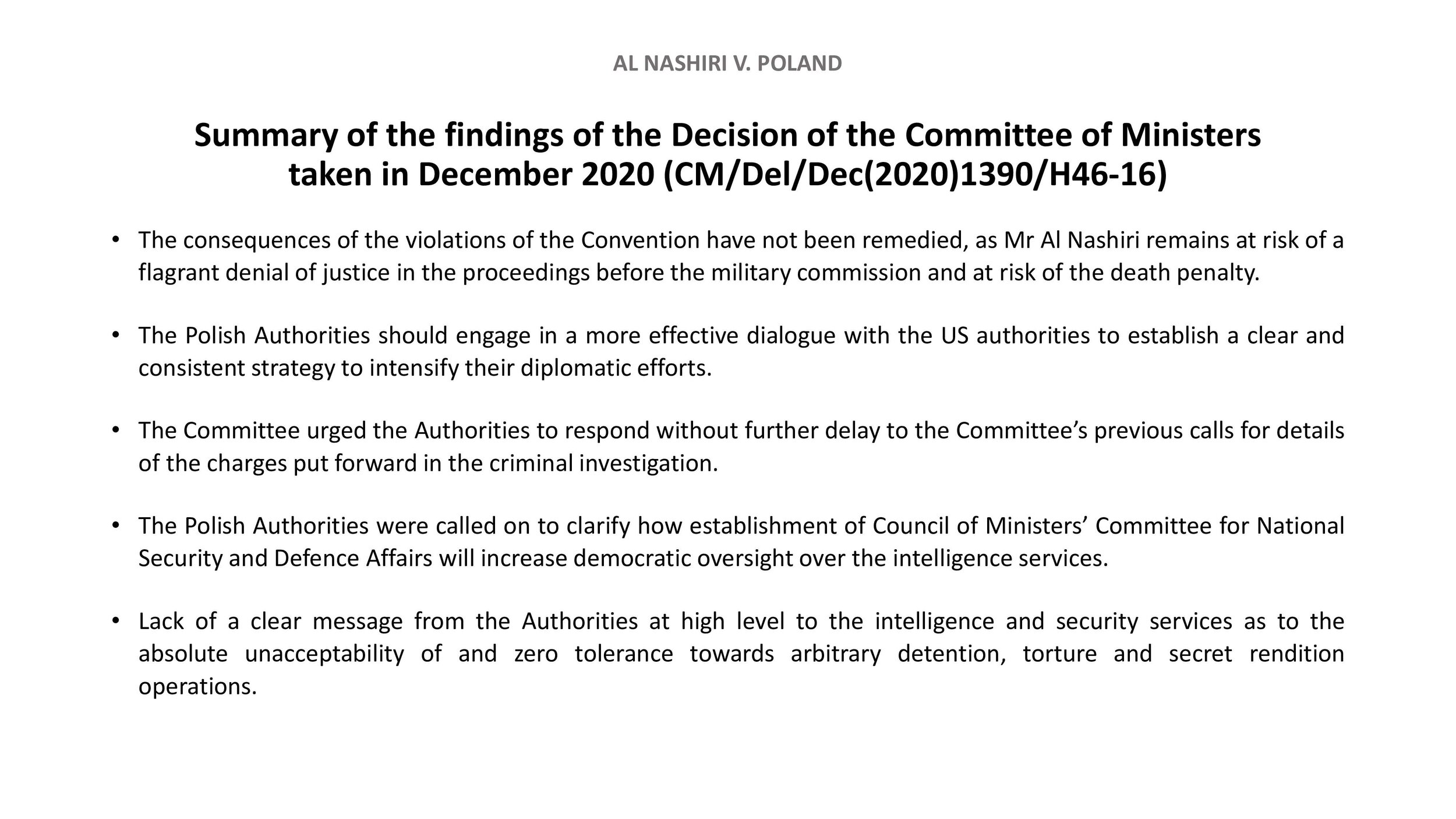
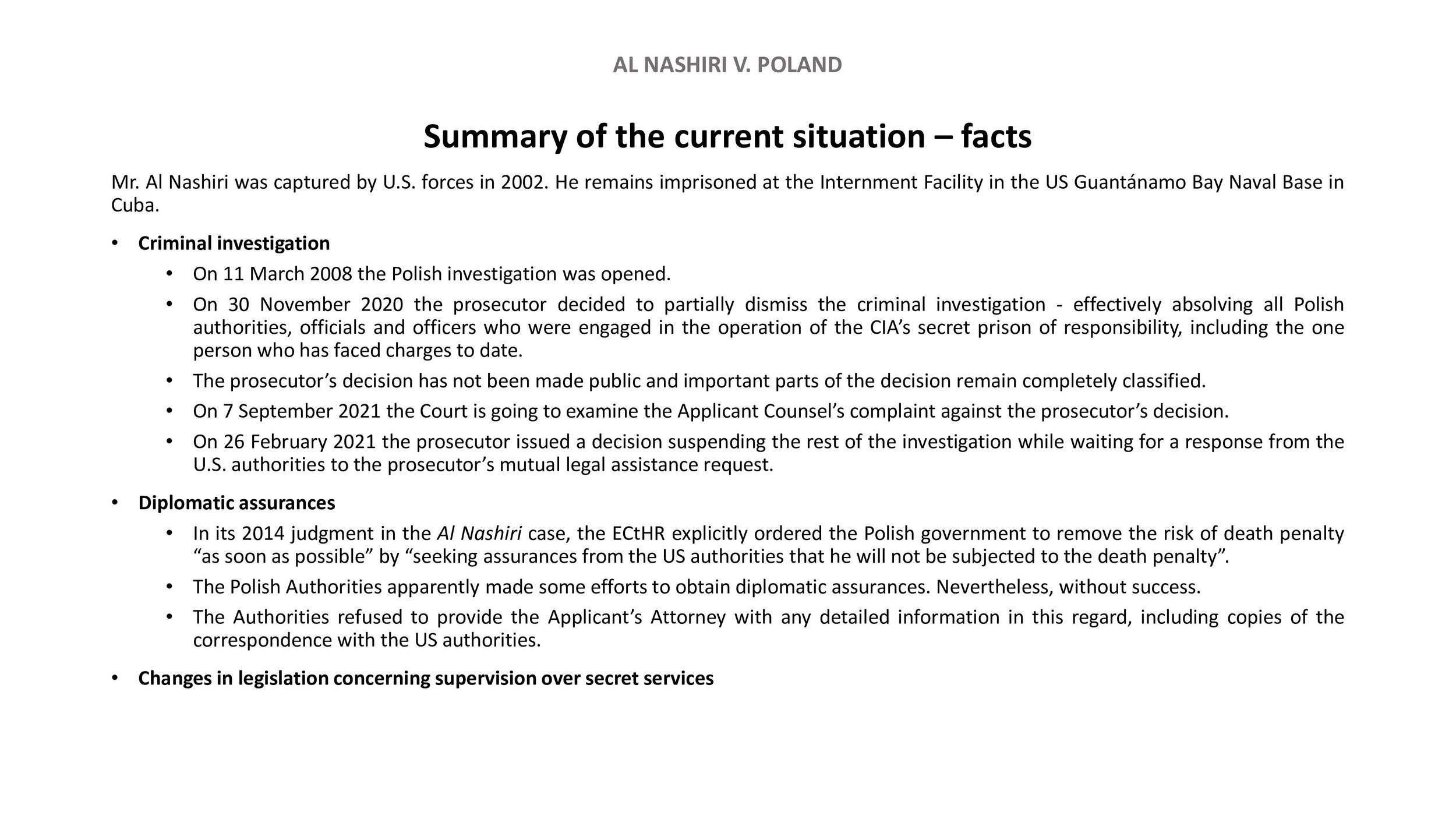
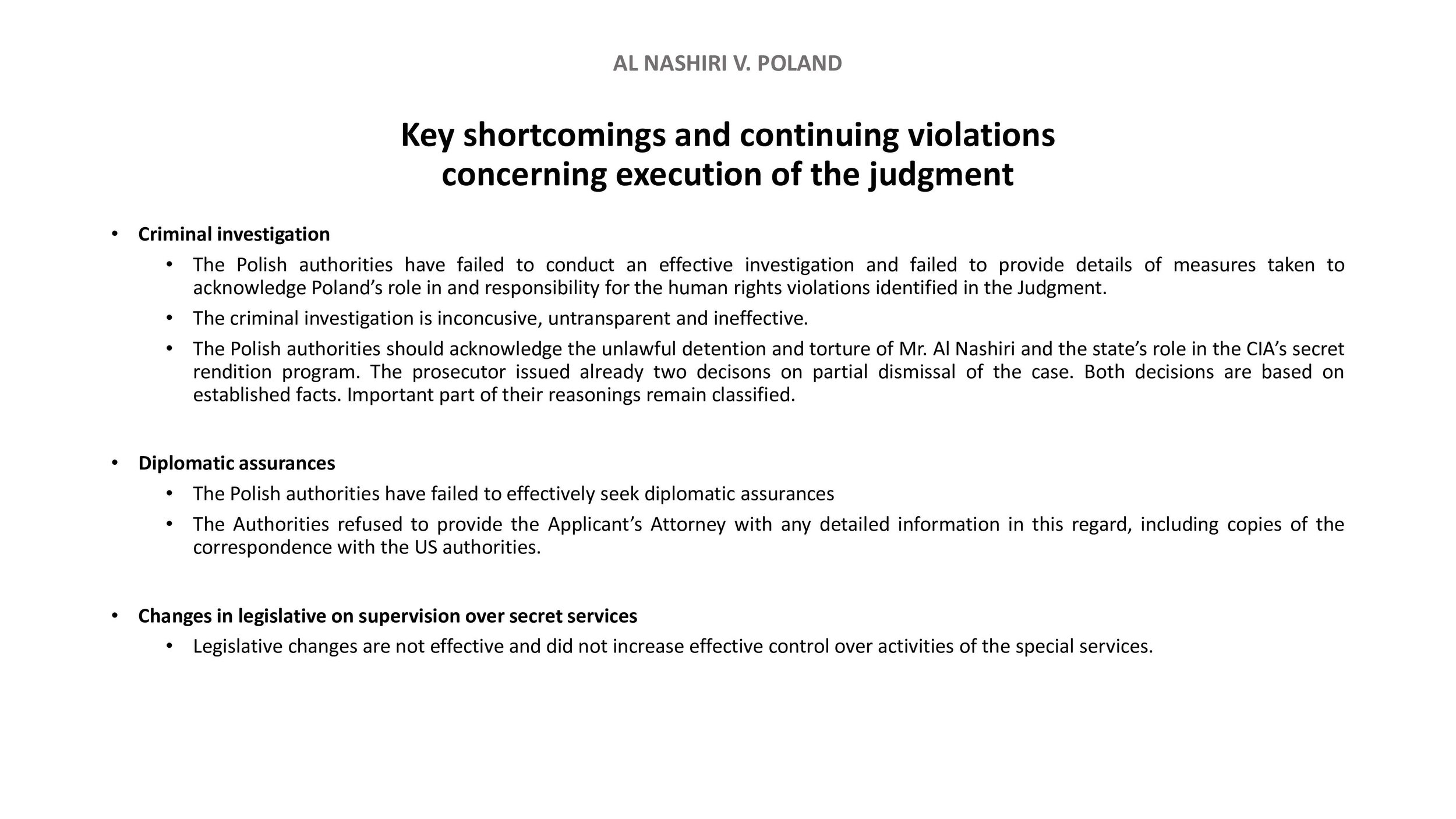
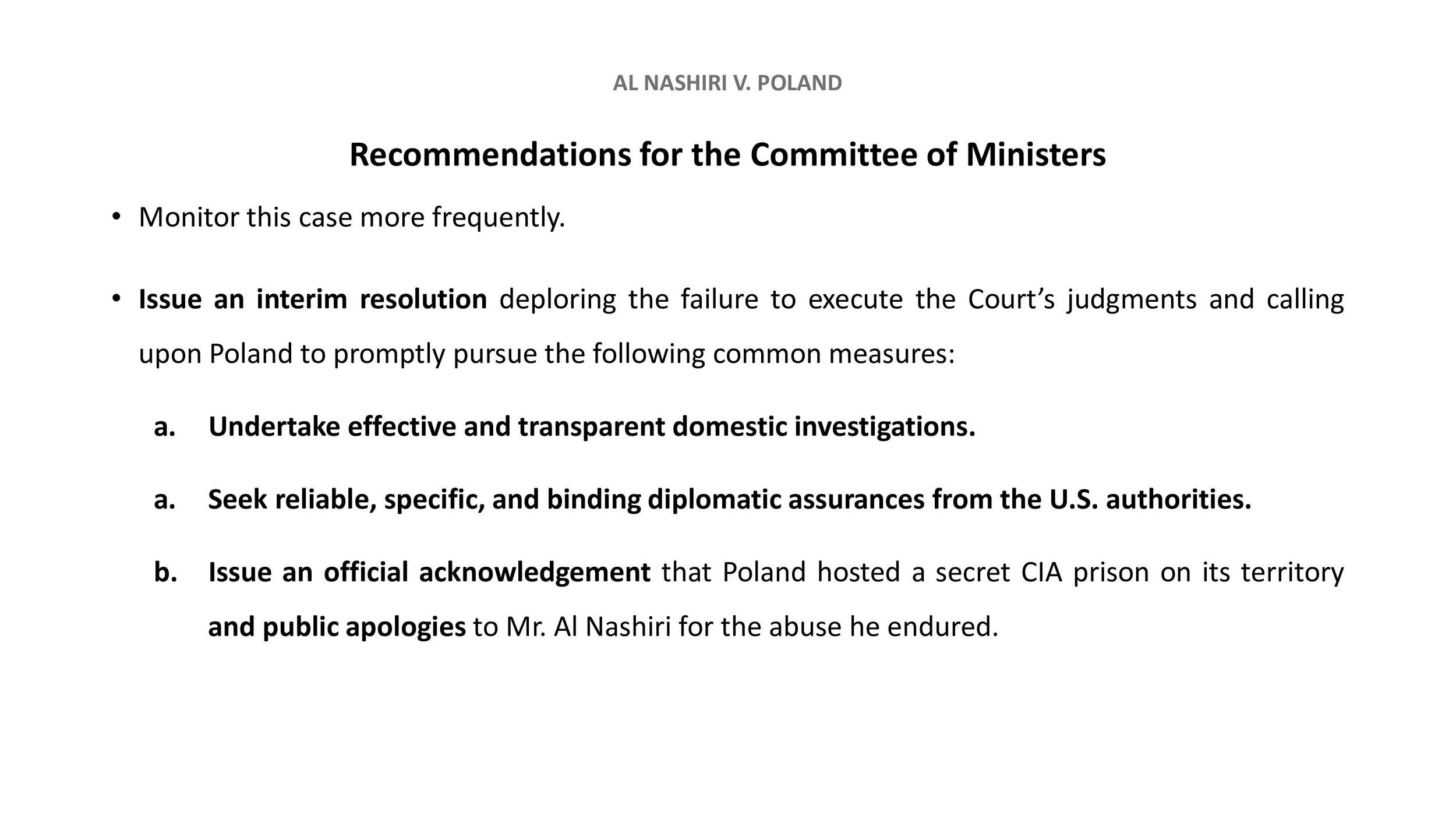
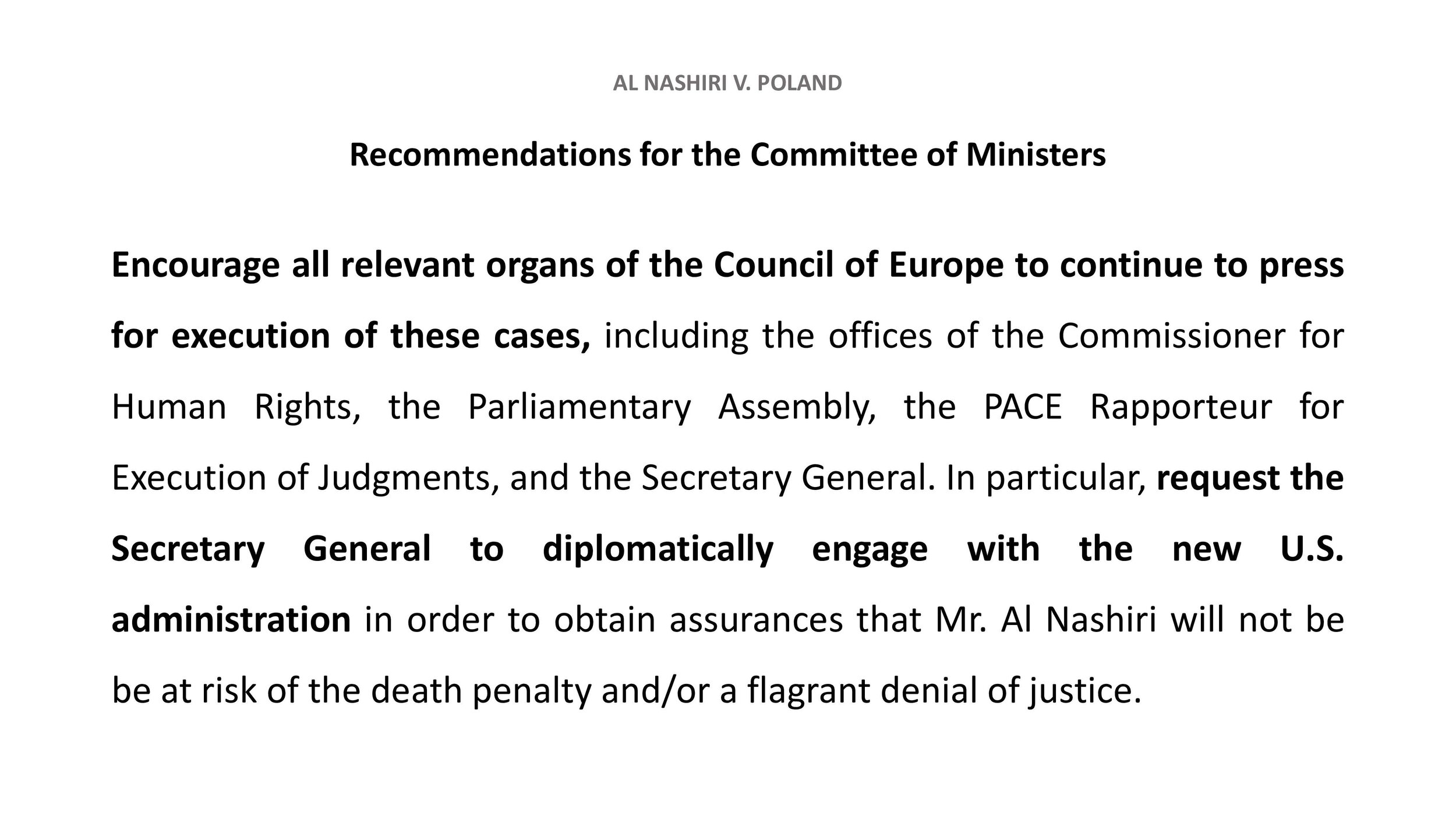
The consequences of the violations of the Convention have not been remedied, as Mr Al Nashiri remains at risk of a flagrant denial of justice in the proceedings before the military commission and risk of the death penalty.
The Polish authorities should engage in a more effective dialogue with the US authorities to establish a clear and consistent strategy to intensify the diplomatic efforts.
The Committee urged authorities to respond without further delay to the Committee’s previous calls for details of the changes put forward in the criminal investigation.
The Polish authorities were called on to clarify how the establishment of the Council of Minister’s Committee for National Security and Defence Affairs will increase democratic oversight over the intelligence services.
There is a lack of a clear message from the authorities at a high level to the intelligence and security services as to the absolute unacceptability of and zero tolerance towards arbitrary detention, torture and secret rendition operations.
Mr. Pietrzak identified several shortcomings concerning the execution of the judgment:
Polish authorities have failed to conduct an effective investigation and failed to provide details of measures taken to acknowledge Poland’s role and responsibility for the human rights violations.
Polish authorities have failed to seek diplomatic assurances from the U.S. government.
Legislative changes are not effective and did not increase effective control over the activities of the special services.
Mr. Pietrzak set out the following recommendations to the Committee of Ministers:
Monitor this case more frequently.
Issue an interim resolution deploring the failure to execute the Court’s judgment and calling upon Poland to promptly pursue the following common measures:
Undertake effective and transparent domestic investigations.
Seek reliable, specific, and binding diplomatic assurances from the U.S. authorities.
Issue an official acknowledgement that Poland hosted a secret CIA prison on its territory and public apologies to Mr. Al Nashiri for the abuse he endured.
Please see the slides for the full Briefing.
Relevant Documents
Rule 9.1 Submissions
CM Decisions
Rule 9.2 Submissions
Al Nashiri v Romania
The case concerns violations of a number of Convention rights arising from the fact that the applicant was the victim of an “extraordinary rendition” operation. The European Court found it established beyond reasonable doubt that Romania hosted a CIA detention site code-named “Detention Site Black”, which operated from 22 September 2003 to 5 November 2005, and that the applicant was secretly detained there from 12 April 2004 to 6 October 2005, or, at the latest, 5 November 2005. He was subsequently transferred by the CIA out of Romania to another of its detention facilities located in Lithuania or in Afghanistan, and eventually to the United States Guantánamo Bay Naval Base in Cuba.
The Court found that his transfer from Romania exposed him to a real and foreseeable risk of a flagrant denial of justice, due in particular to the possibility that evidence obtained under torture could be admitted in the proceedings already engaged against him at the time of the judgment before a military commission at the Guantánamo Bay Naval Base and of being subjected to the death penalty following his trial.
Overview of Al Nashiri v Romania Briefing
Open Society Justice Initiative updated the participants on recent developments in the case:
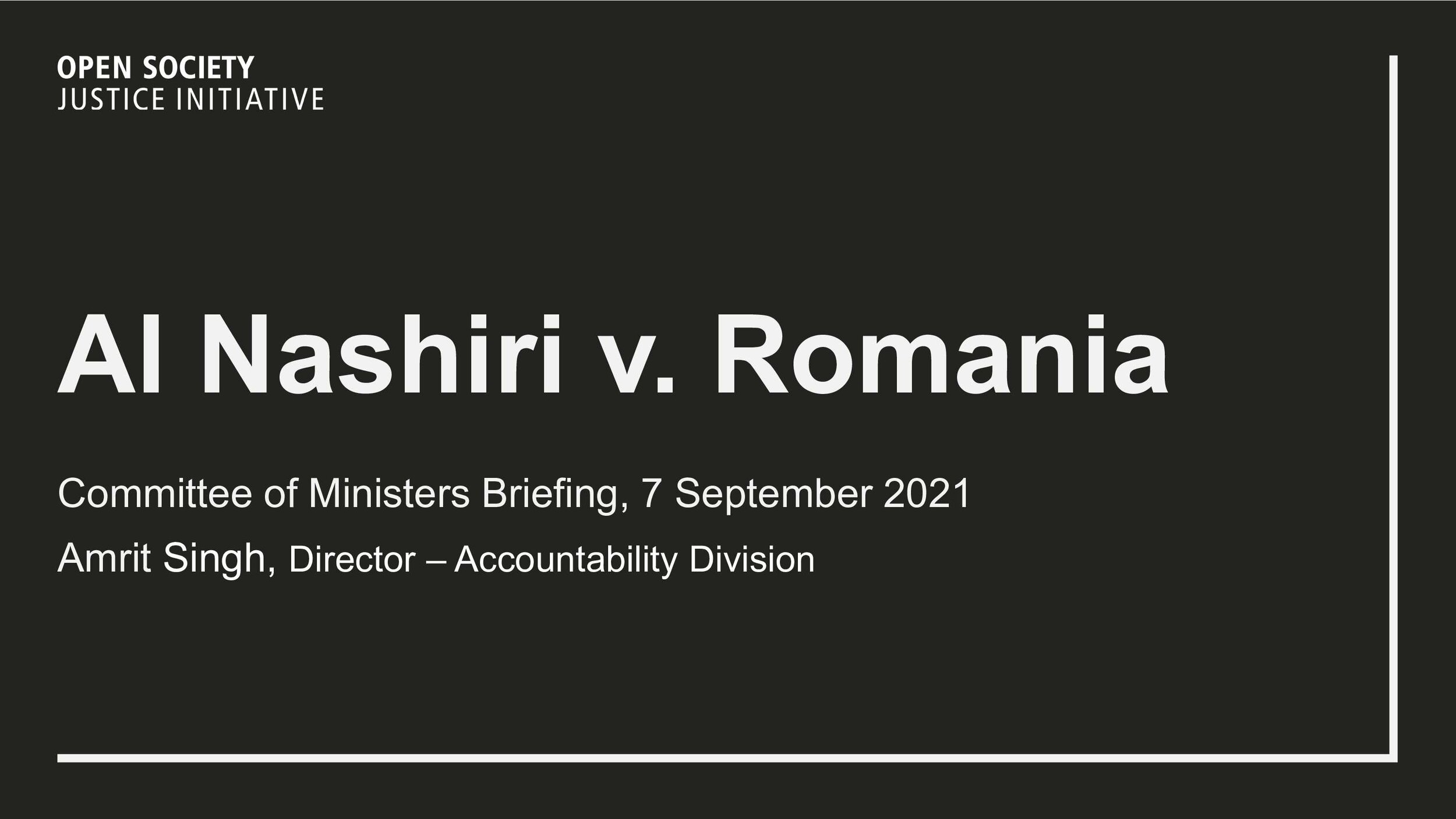
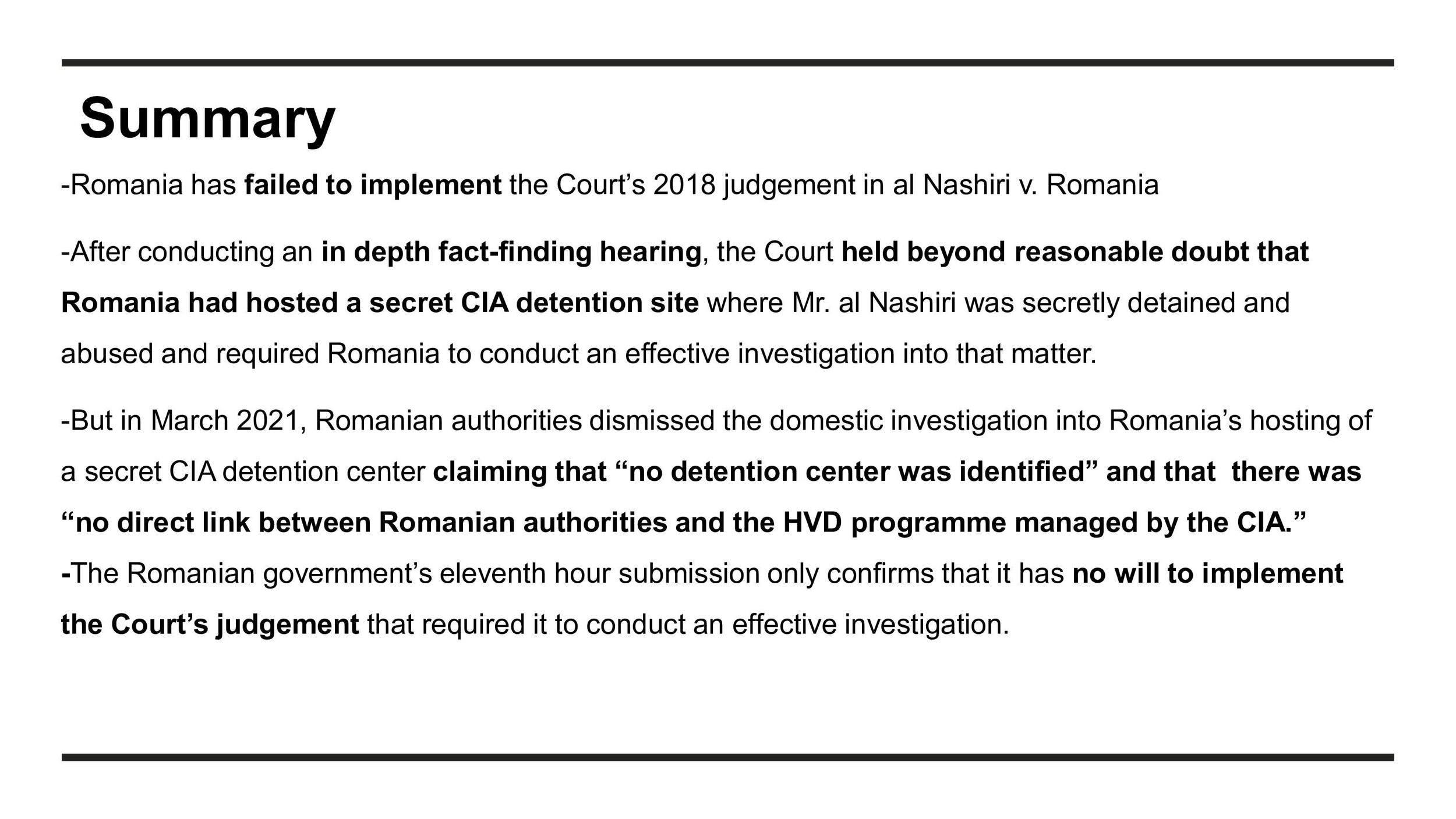
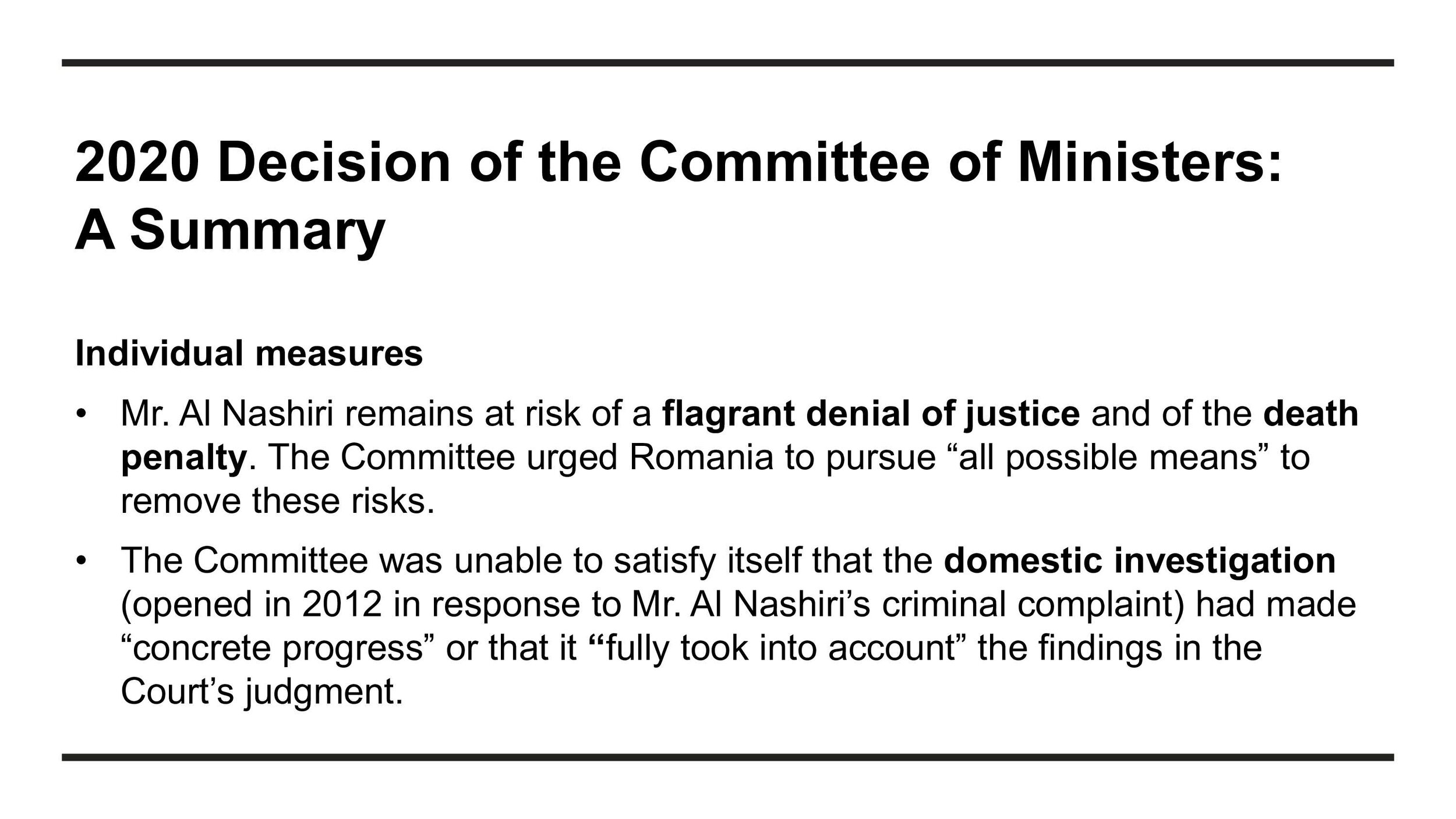
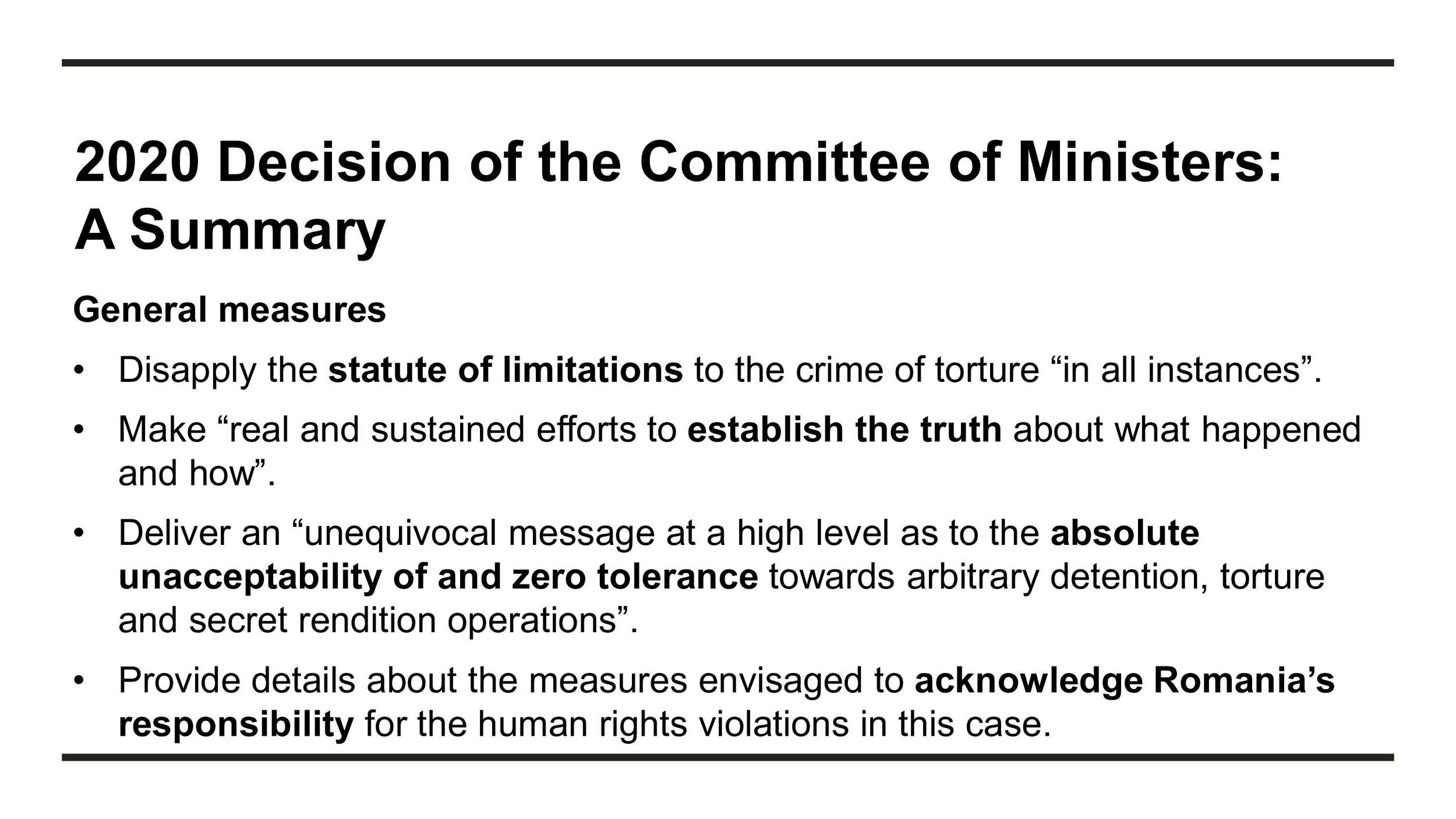
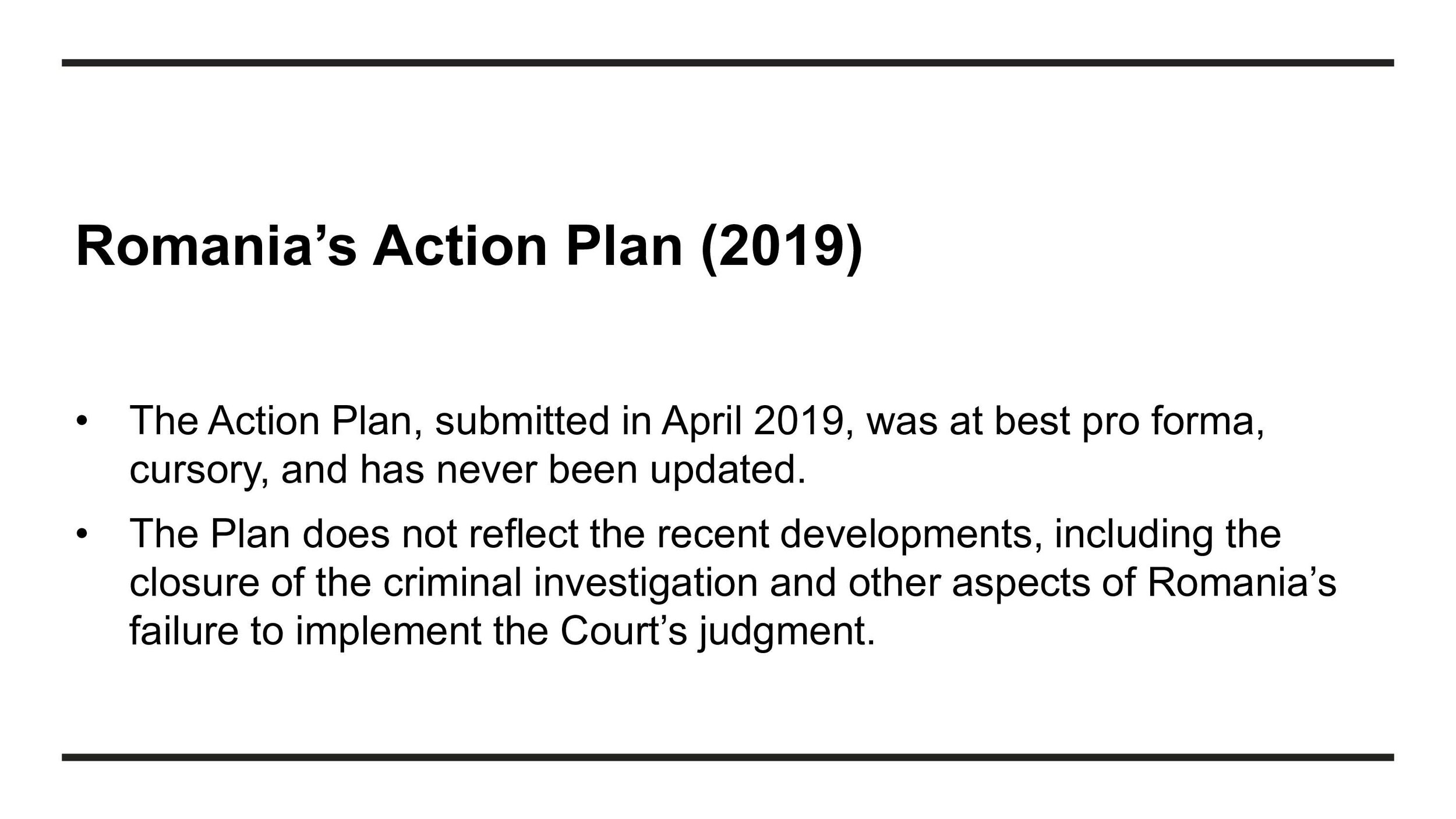
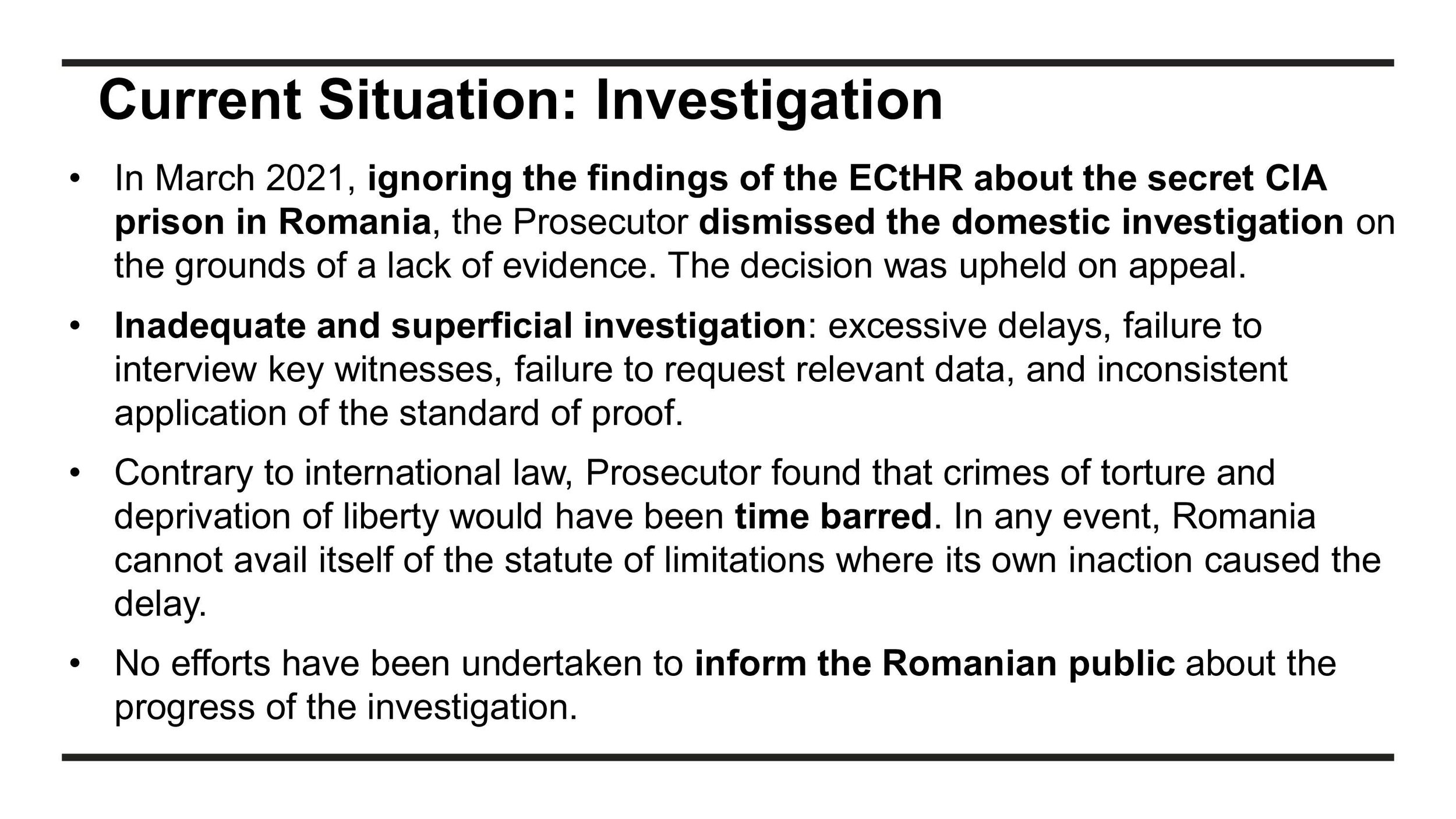
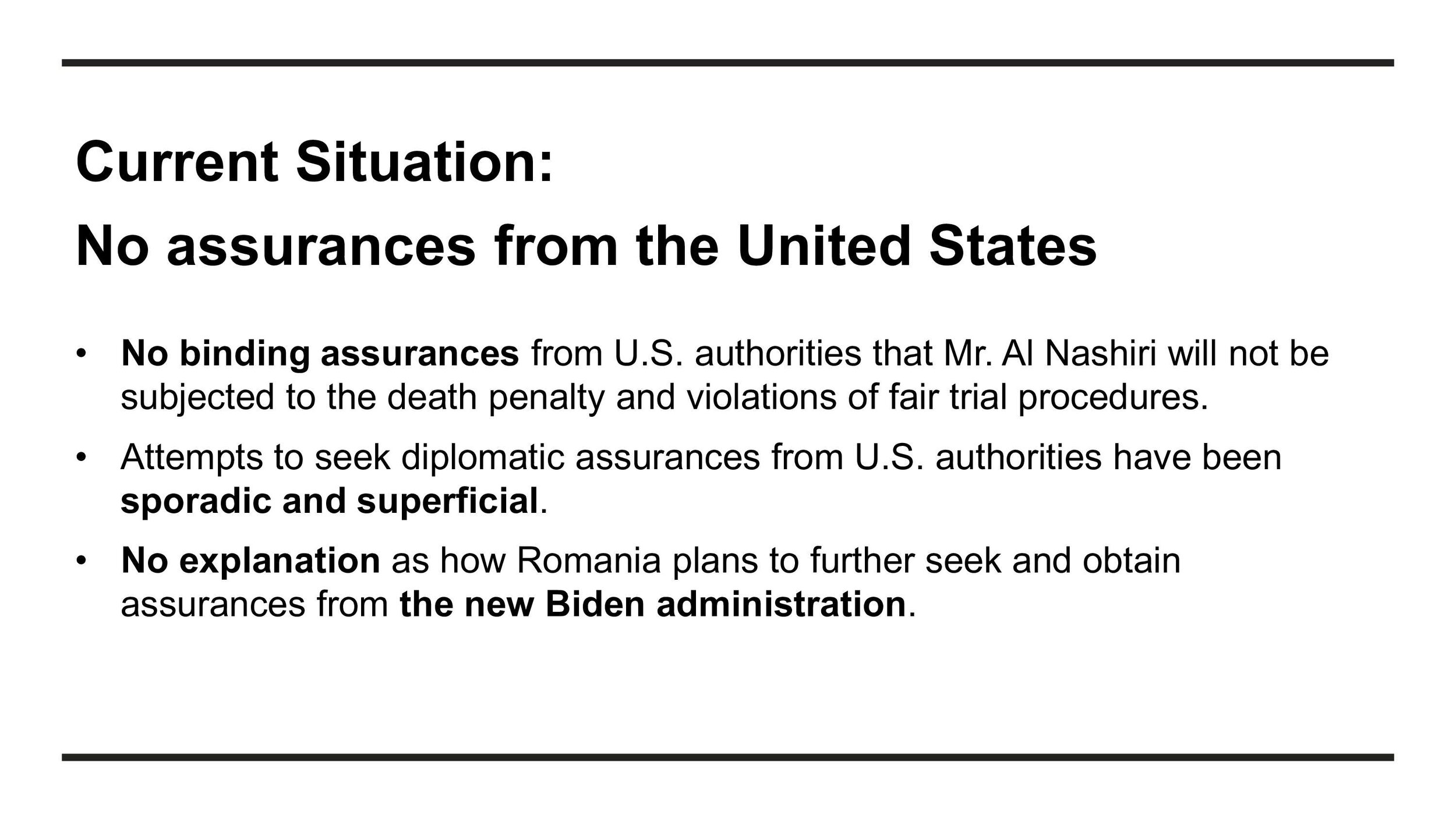
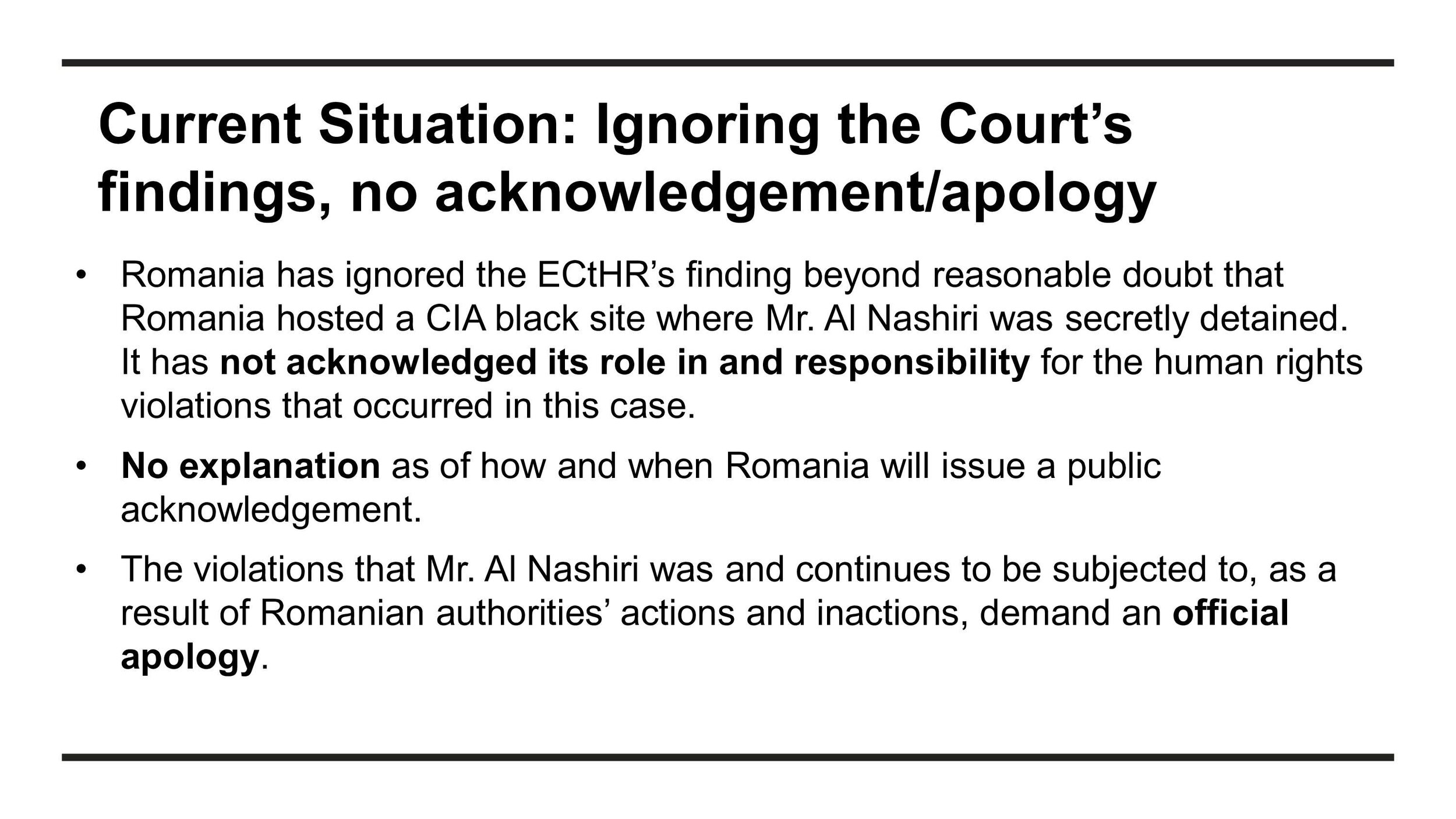
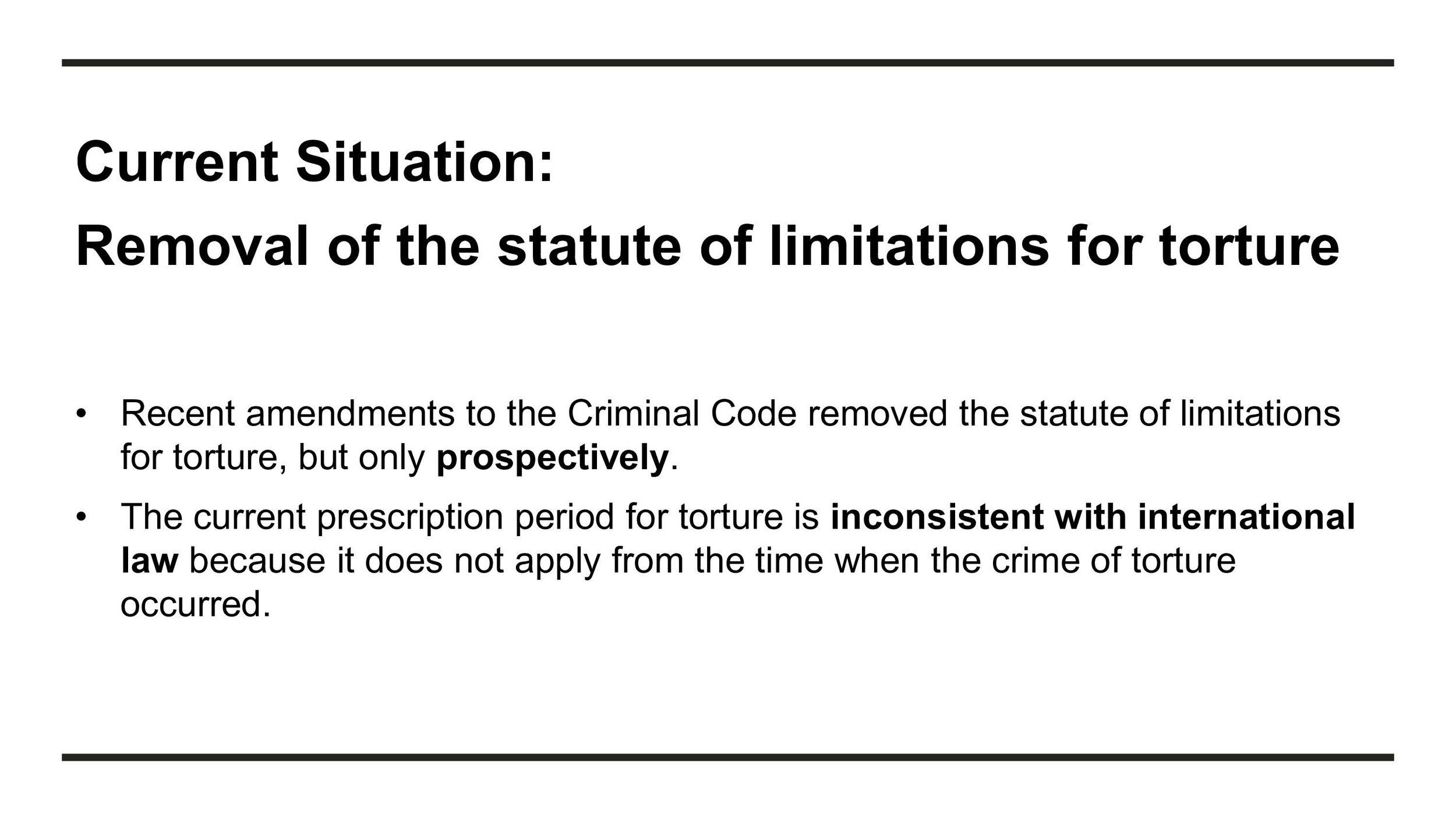
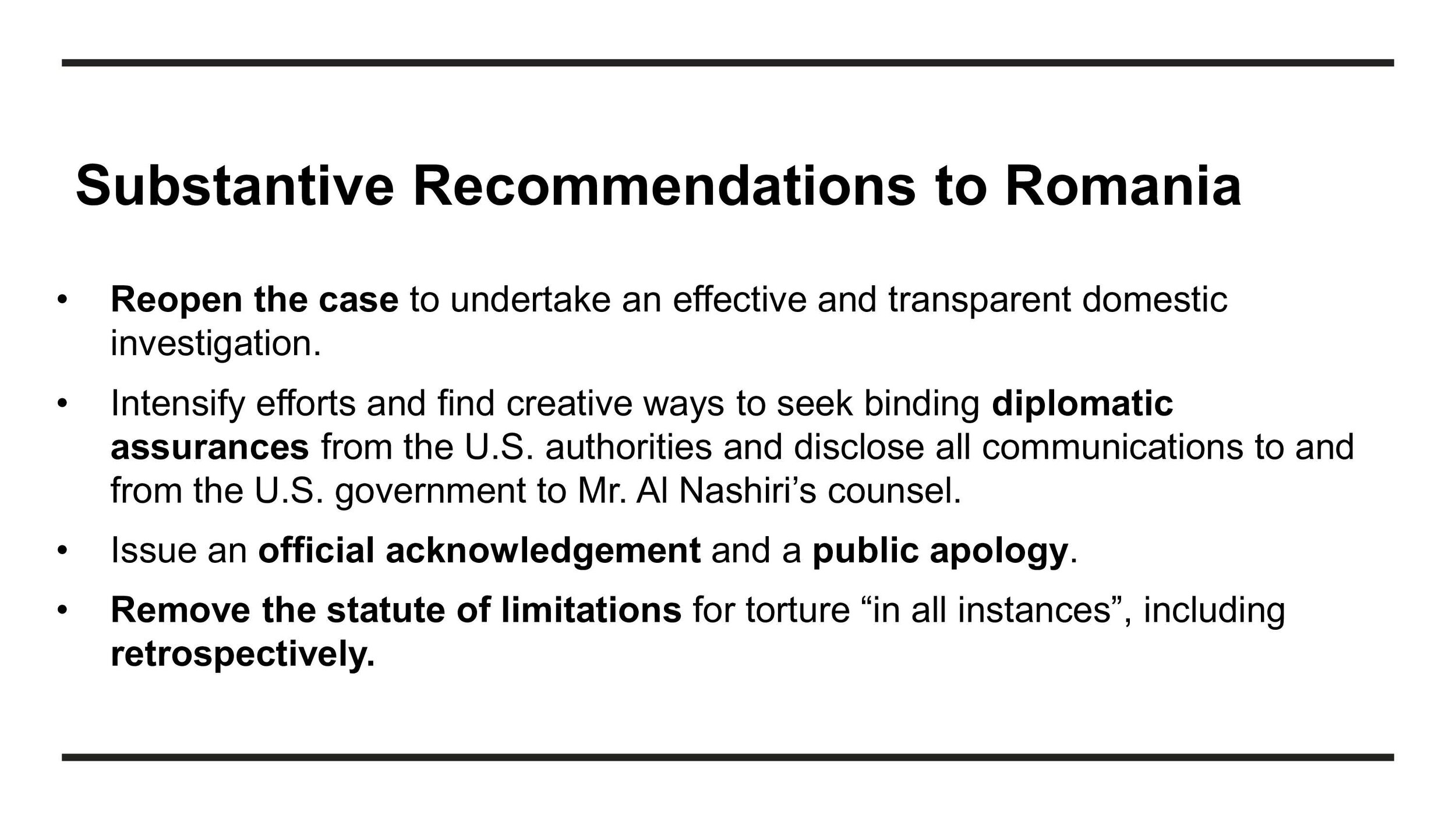
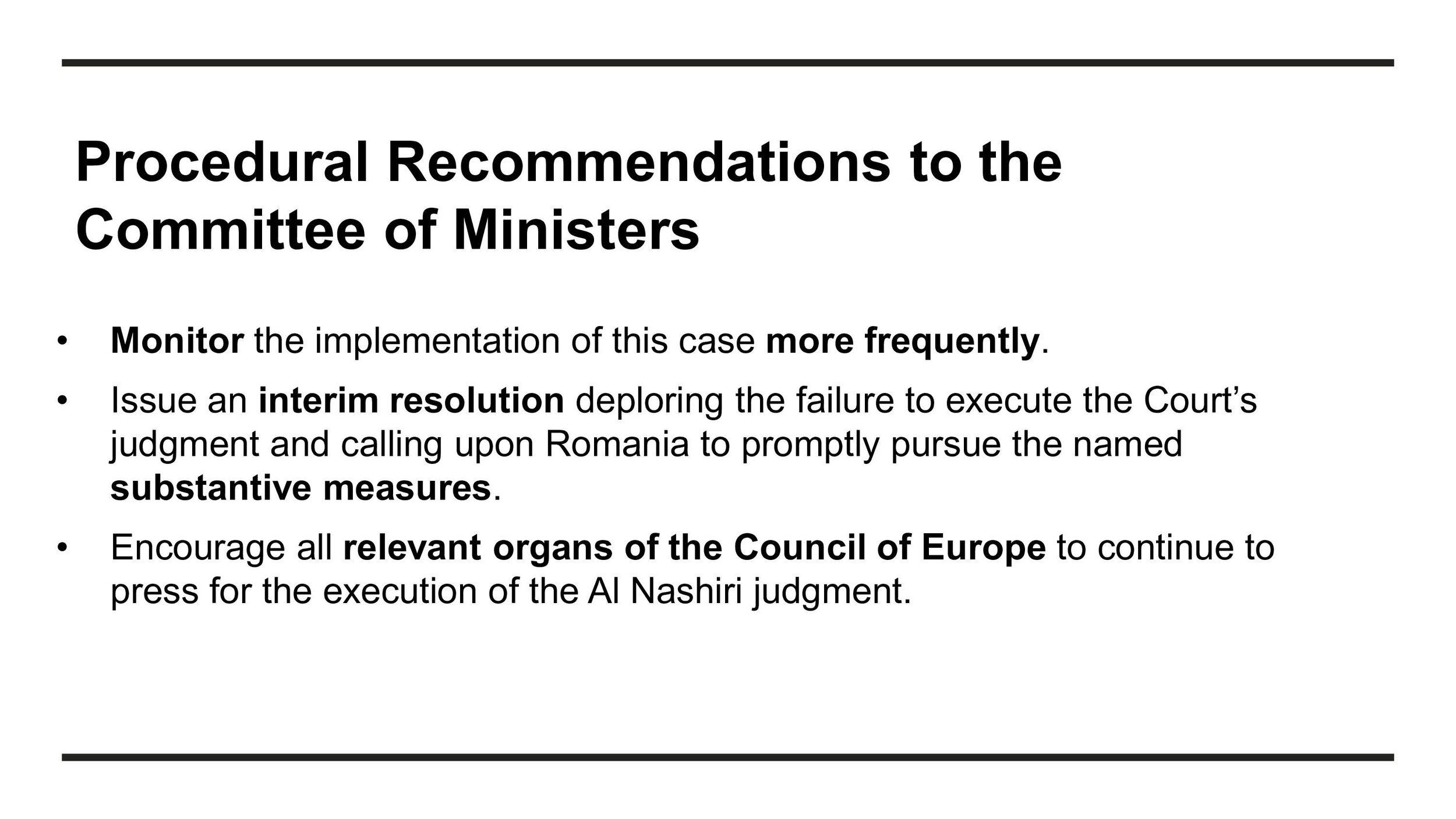
In March 2021, ignoring the findings of the ECtHR about the secret CIA prison in Romania, the Prosecutor dismissed the domestic investigation on the grounds of a lack of evidence. The decision was upheld on appeal.
Inadequate and superficial investigation: excessive delays, failure to interview key witnesses, failure to request relevant data, and inconsistent application of the standard of proof.
Contrary to international law, the prosecutor found that crimes of torture and deprivation of liberty would have been time-barred. In any event, Romania cannot avail itself of the statute of limitations where its own inaction caused the delay.
No efforts have been undertaken to inform the Romanian public about the progress of the investigation.
No binding assurances have been obtained from U.S. authorities that Mr Al Nashiri will not be subjected to the death penalty and violations of fair trial procedures.
Attempts to seek diplomatic assurances from U.S. authorities have been sporadic and superficial.
No explanation has been provided as to how Romania plans to further seek and obtain assurances from the new Biden administration.
Romania has ignored the ECtHR’s finding beyond reasonable doubt that Romania hosted a CIA black site where Mr. Al Nashiri was secretly detained. It has not acknowledged its role in and responsibility for the human rights violations that occurred in this case.
No explanation has been provided as to how and when Romania will issue a public acknowledgement.
The violations that Mr. Al Nashiri was and continues to be subjected to, as a result of Romanian authorities’ actions and inactions, demand an official apology.
Recent amendments to the Criminal Code removed the statute of limitations for torture, but only prospectively.
The current prescription period for torture is inconsistent with international law because it does not apply from the time when the crime of torture occurred.
Open Society Justice Initiative reminded participants of Romania’s 2020 Action Plan:
The Action Plan, submitted in April 2019, was at best pro forma, cursory, and has never been updated.
The Plan does not reflect the recent developments, including the closure of the criminal investigation and other aspects of Romania’s failure to implement the Court’s judgment.
Open Society Justice Initiative provides substantive recommendations for Romania to:
Reopen the case to undertake an effective and transparent domestic investigation.
Intensify efforts and find creative ways to seek binding diplomatic assurances from the U.S government to Mr Al Nashiri’s counsel
Issue an official acknowledgement and a public apology
Remove the statute of limitations for torture “in all instances”, including retrospectively
Open Society Justice Initiative made procedural recommendations for the CM to:
Monitor the implementation of this case more frequently.
Issue an interim resolution deploring the failure to execute the Court’s judgment and calling upon Romania to promptly pursue the named substantive measures.
Encourage all relevant organs of the Council of Europe to continue to press for the execution of the Al Nashiri judgment.
Please see the slides for the full Briefing.
Relevant Documents
Rule 9.2 Submissions
Abu Zubaydah v Poland and Abu Zubaydah v Lithuania
This cases concern the violation of a number of Convention rights arising from the fact that the applicant was a victim of a secret “rendition” operation, involving his transfer between various CIA detention facilities, including one located in Afghanistan.
In Abu Zubaydah v. Poland, the European Court found it established beyond reasonable doubt that the applicant arrived in Poland on board a Central Intelligence Agency (CIA) rendition aircraft on 5 December 2002 and was detained in a CIA detention facility in Stare Kiejkuty. He was subsequently transferred out of Poland, respectively in June and September 2003, to other CIA detention facilities and eventually to the United States Guantánamo Bay Naval Base in Cuba.
The Court found that the transfer from Poland exposed him to a real risk of a flagrant denial of justice due to the possibility he would face trial before United States’ military commissions at the Guantánamo Bay Naval Base using evidence obtained under torture. In this context, the Court also noted that no case against Mr Abu Zubaydah had been listed for trial and found that his indefinite detention without charge in itself amounted to a flagrant denial of justice.
In Abu Zubaydah v. Lithuania, the European Court found it established beyond reasonable doubt that Lithuania had hosted a Central Intelligence Agency (CIA) detention facility, code-named “Detention Site Violet”, operated from either 17 or 18 February 2005 until 25 March 2006 and the applicant was secretly detained there during that period. He was transferred by the CIA out of Lithuania to another CIA detention site in Afghanistan and eventually to the United States Guantánamo Bay Naval Base in Cuba.
The Court found that, by enabling the applicant’s further transfer to another CIA detention site, the Lithuanian authorities had also exposed him to a foreseeable risk of continued secret, incommunicado and otherwise arbitrary detention, liable to continue for the rest of his life as well as to further ill-treatment and conditions of detention, in breach of Article 3. At the time of the judgment, the applicant was detained in the Guantánamo Bay Naval Base. No criminal proceedings against him had been engaged.
Overview of the Abu Zubaydah v Poland and Abu Zubaydah v Lithuania Briefing
Human Rights in Practice reminded participants of the issues of concern of the cases:
The Court concluded that, through collaboration with Lithuanian, Romanian and Polish authorities, the CIA secretly imprisoned, tortured, and ill-treated Mr Abd al Rahim al Nashiri and Mr Abu Zubaydah, subjecting them to years of abuse. Now detained at Guantanamo Bay since 2006, both men are subject to an ongoing “flagrant denial of justice”.
Compliance with these judgments is a critical aspect of meaningful accountability for European complicity in the CIA’s secret detention and torture program.
Human Rights in Practice provided information on recent developments regarding the cases:
Mr Abu Zubaydah has been held without any review of the lawfulness of his detention by a court or independent legal authority, and without charge or trial, for nineteen years. He falls into the category dubbed “forever prisoners” who the U.S. administration refuses to charge or try but will not release. This situation remains unchanged.
Welcomed the securing of power of attorney status for the applicant, and a beneficiary has been nominated, this is the first step for just satisfaction to be released.
Human Rights in Practice recommended that the Committee of Ministers:
Monitor these cases more frequently and schedule them for oral debate, beginning with the next CM/DH meeting in September 2021;
Issue an interim resolution deploring the failure to execute the Court’s judgments and calling upon Poland, Romania, and Lithuania to promptly pursue the following common measures:
Undertake effective and transparent domestic investigations. Where criminal investigations have already been closed, authorities should undertake specific measures to reopen them with the aim of conducting a prompt, thorough and effective inquiry into their government’s role in the CIA’s extraordinary rendition and secret detention program, consistent with the ECtHR’s findings that such conduct indeed occurred. The terms of reference of the investigations should be disclosed to Mr Al Nashiri’s and Mr Abu Zubaydah’s counsel and the public, and the materials from these investigations should be declassified to the fullest extent possible and, where possible made public, particularly transcripts of witness testimonies, responses to data/documents requests, and any procedural decisions made by the Prosecutor.
Seek reliable and specific diplomatic assurances from the U.S. authorities that Mr Nashiri and Mr Abu Zubaydah will not be subjected to the death penalty and/or a flagrant denial of justice. With a new U.S. administration in place, Polish, Romanian, and Lithuanian authorities at the highest level should redouble their efforts to seek such assurances. All communications to and from the U.S. government in relation to these assurances should also be disclosed to Mr Al Nashiri’s and Mr Abu Zubaydah’s counsels, so that they can monitor the government’s compliance with the Court’s judgment.
Issue an official acknowledgement that Romania, Poland, and Lithuania hosted a secret CIA prison on their territories and public apologies to Mr Al Nashiri and Mr Abu Zubaydah for the abuse they endured.
Insist that Poland and Lithuania facilitate the prompt payment of just satisfaction due to Mr Abu Zubaydah’s designated beneficiary.
Insist that Romania removes the statute of limitations for the crime of torture “in all instances” i.e. to include liability for acts of torture whenever they occurred, including retrospectively.
Encourage all relevant organs of the Council of Europe to continue to press for the execution of these cases, including the offices of the Commissioner for Human Rights, the Parliamentary Assembly, the PACE Rapporteur for Execution of Judgments, and the Secretary General. In particular, request the Secretary General to diplomatically engage with the new U.S. administration in order to obtain assurances that neither Mr Al Nashiri, nor Mr Abu Zubaydah would be at risk of the death penalty and/or a flagrant denial of justice.
Relevant Documents on Abu Zubaydah v Poland
CM Decisions
9.2 Submissions
Relevant information on Abu Zubaydah v Lithuania
9.2 Submissions
Sejdic and Finci v BiH
These cases concern discrimination against the applicants on account of their ineligibility to stand for election to the Presidency of Bosnia and Herzegovina due to their lack of affiliation with a constituent people (i.e. Bosniaks, Croats or Serbs) or due to their failure to meet a combination of the requirements of ethnic origin and place of residence (violations of Article 1 of Protocol No. 12).
In accordance with the Constitution of Bosnia and Herzegovina, only persons declaring affiliation with a “constituent people” are entitled to stand for election to the Presidency, which consists of three members: one Bosniak and one Croat, each directly elected from the Federation of Bosnia and Herzegovina, and one Serb directly elected from the Republika Srpska.
Overview of Sejdic and Finci v BiH Briefing
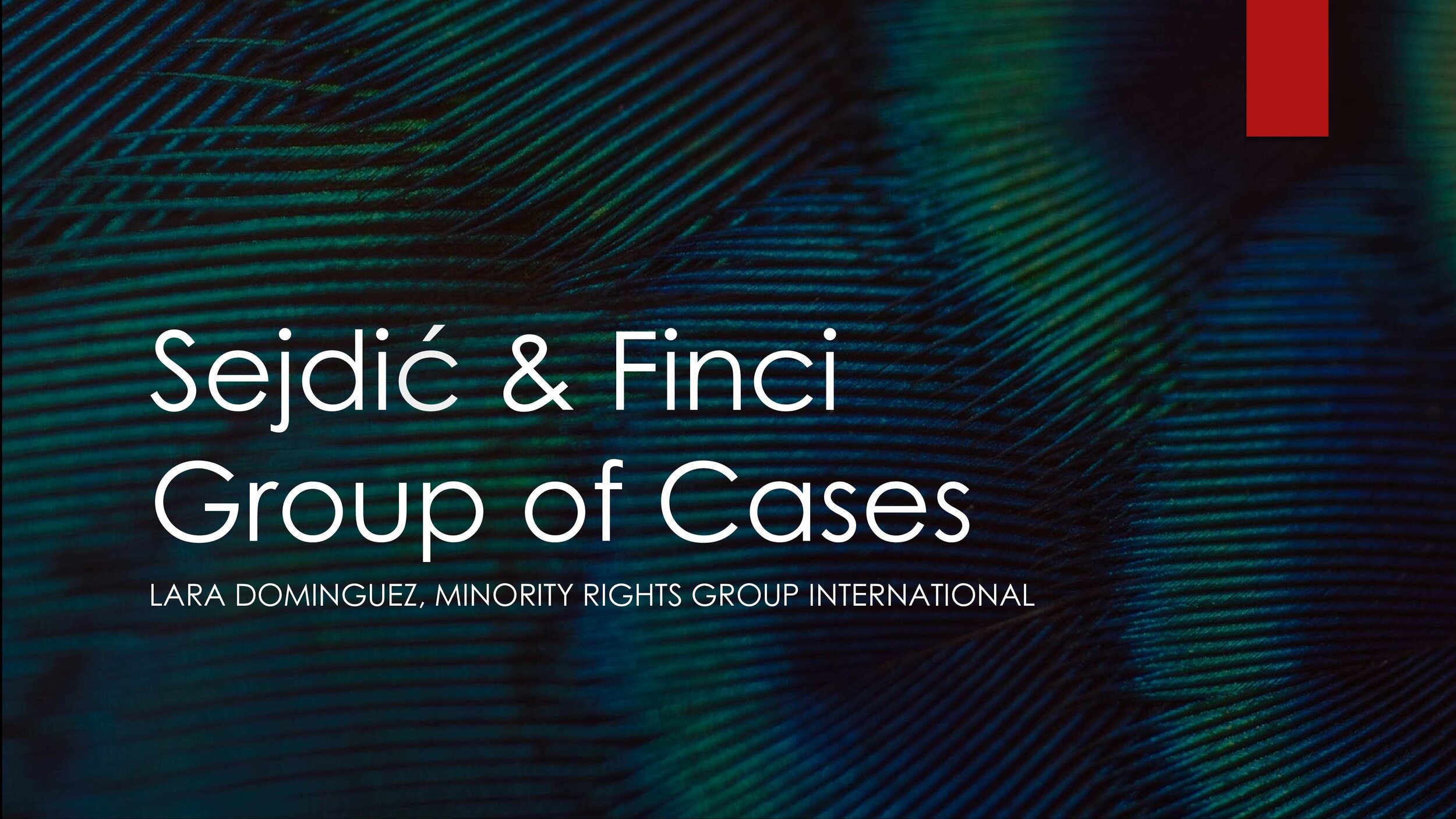
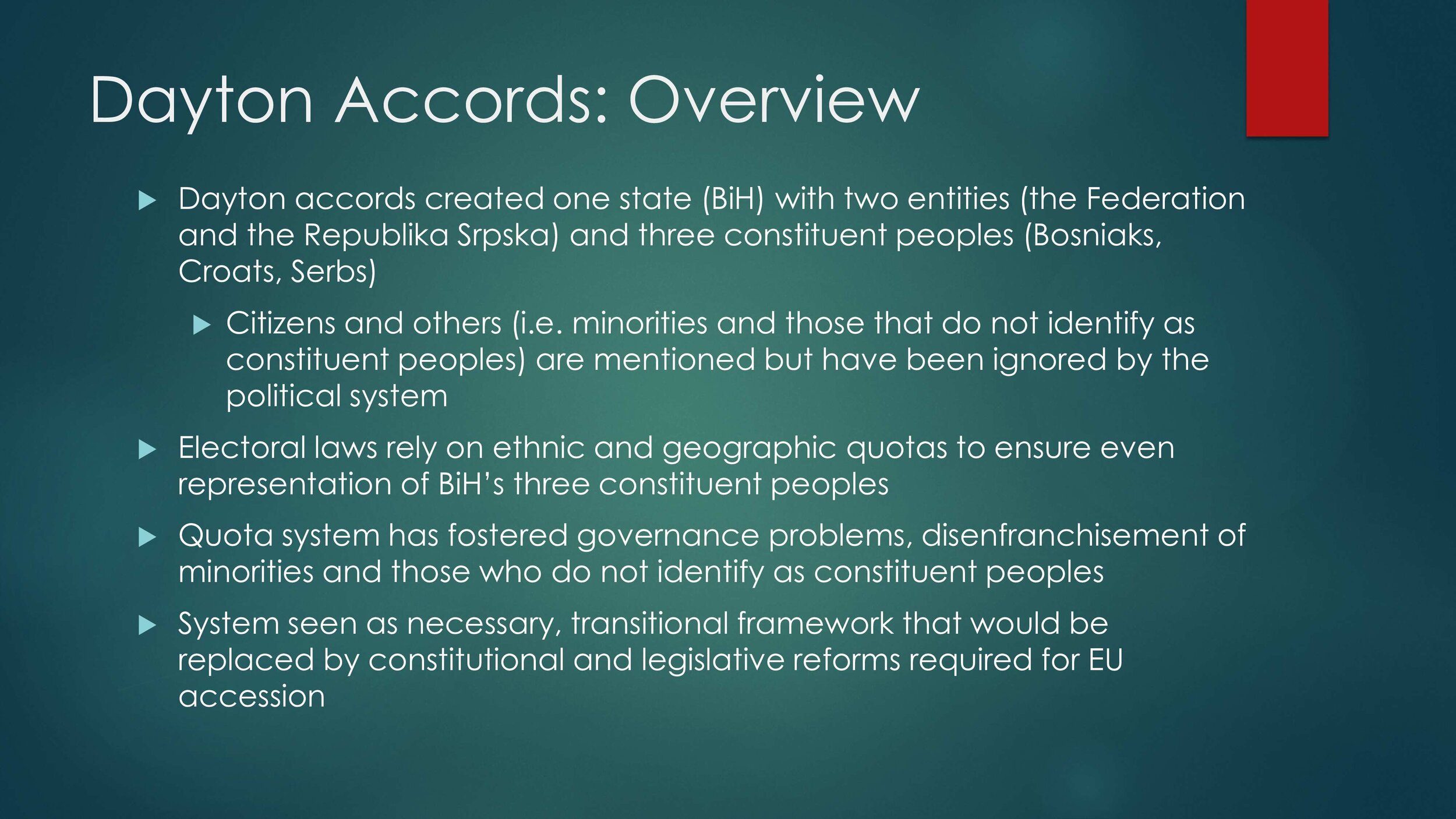
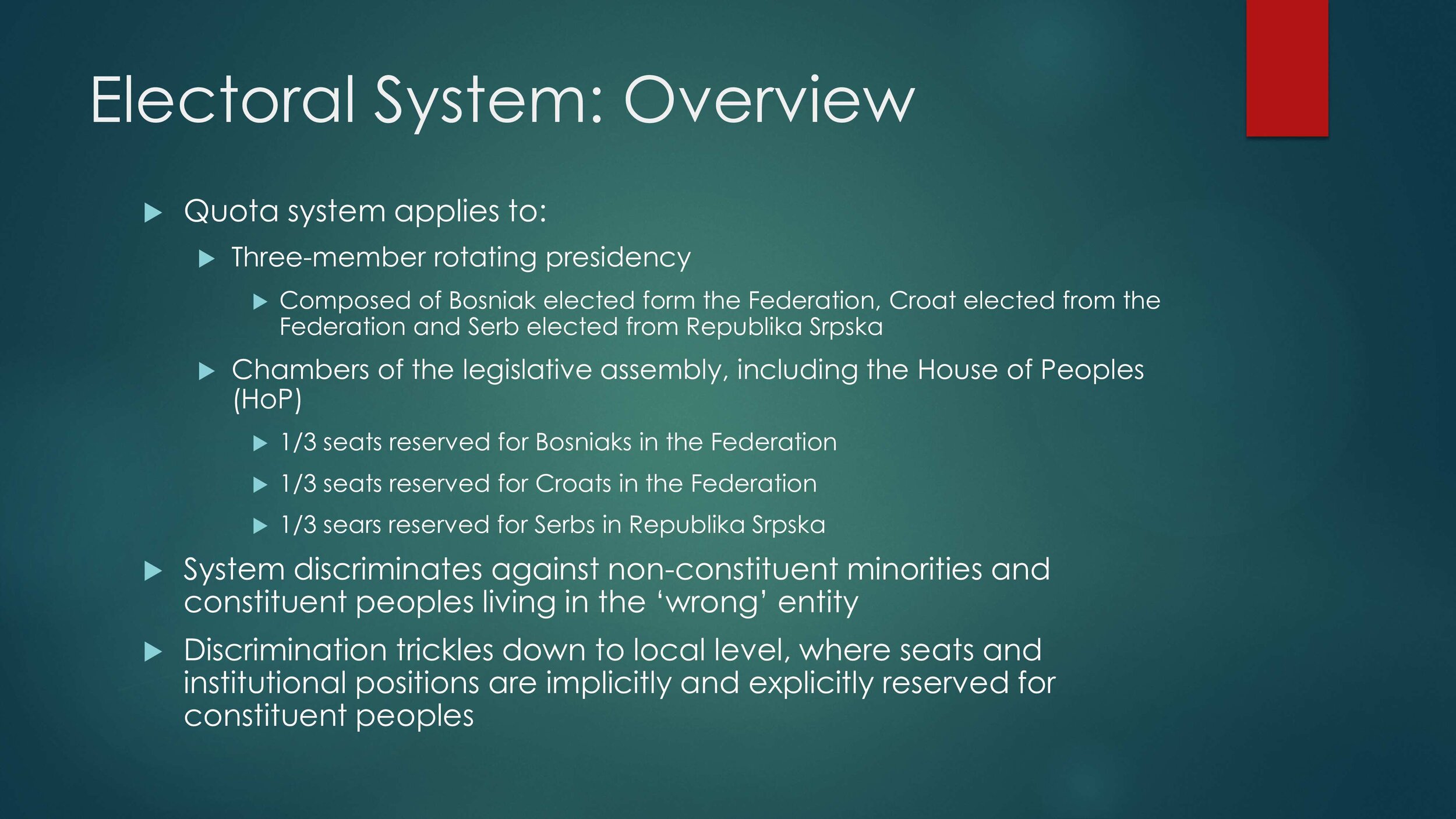
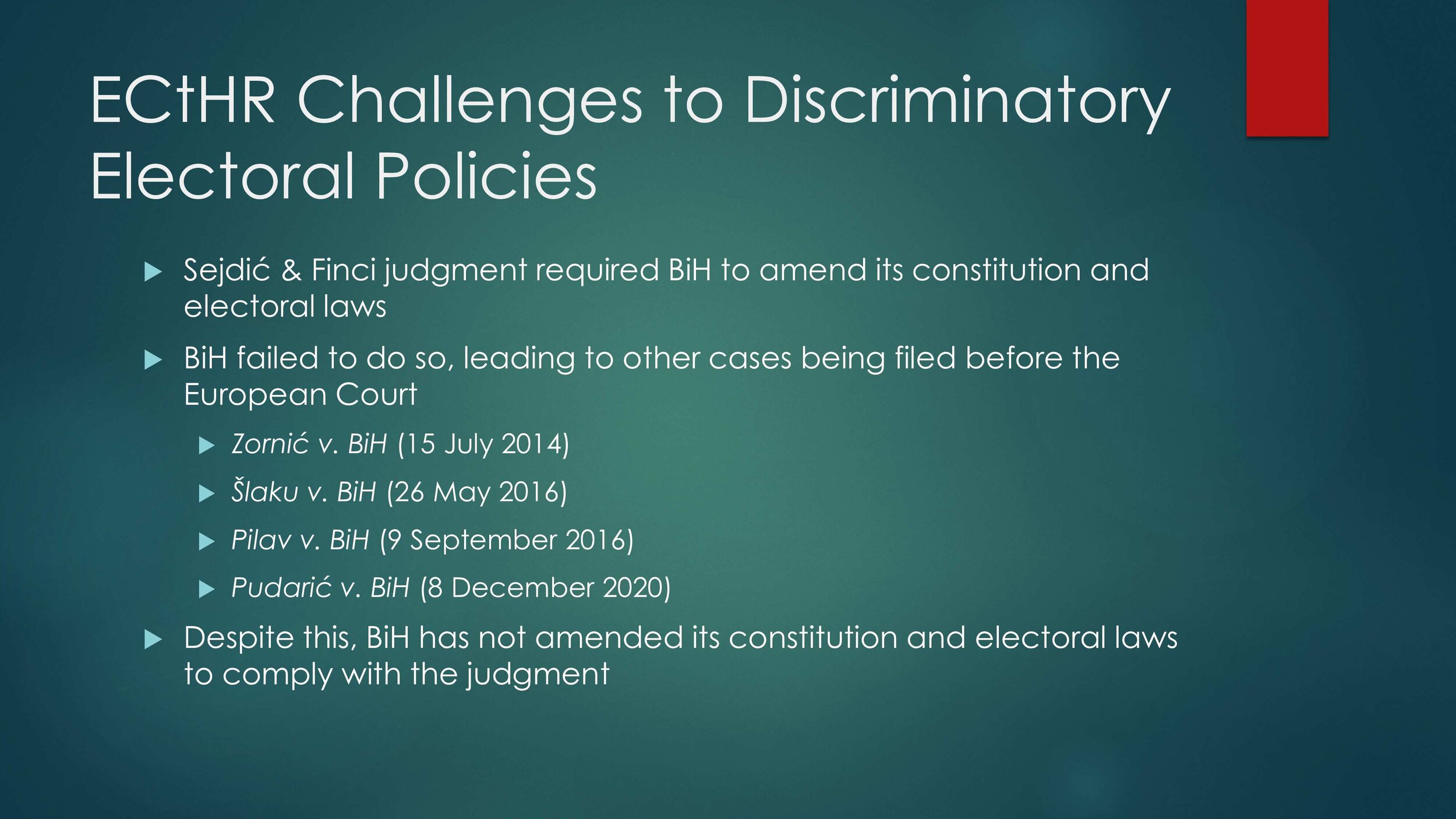
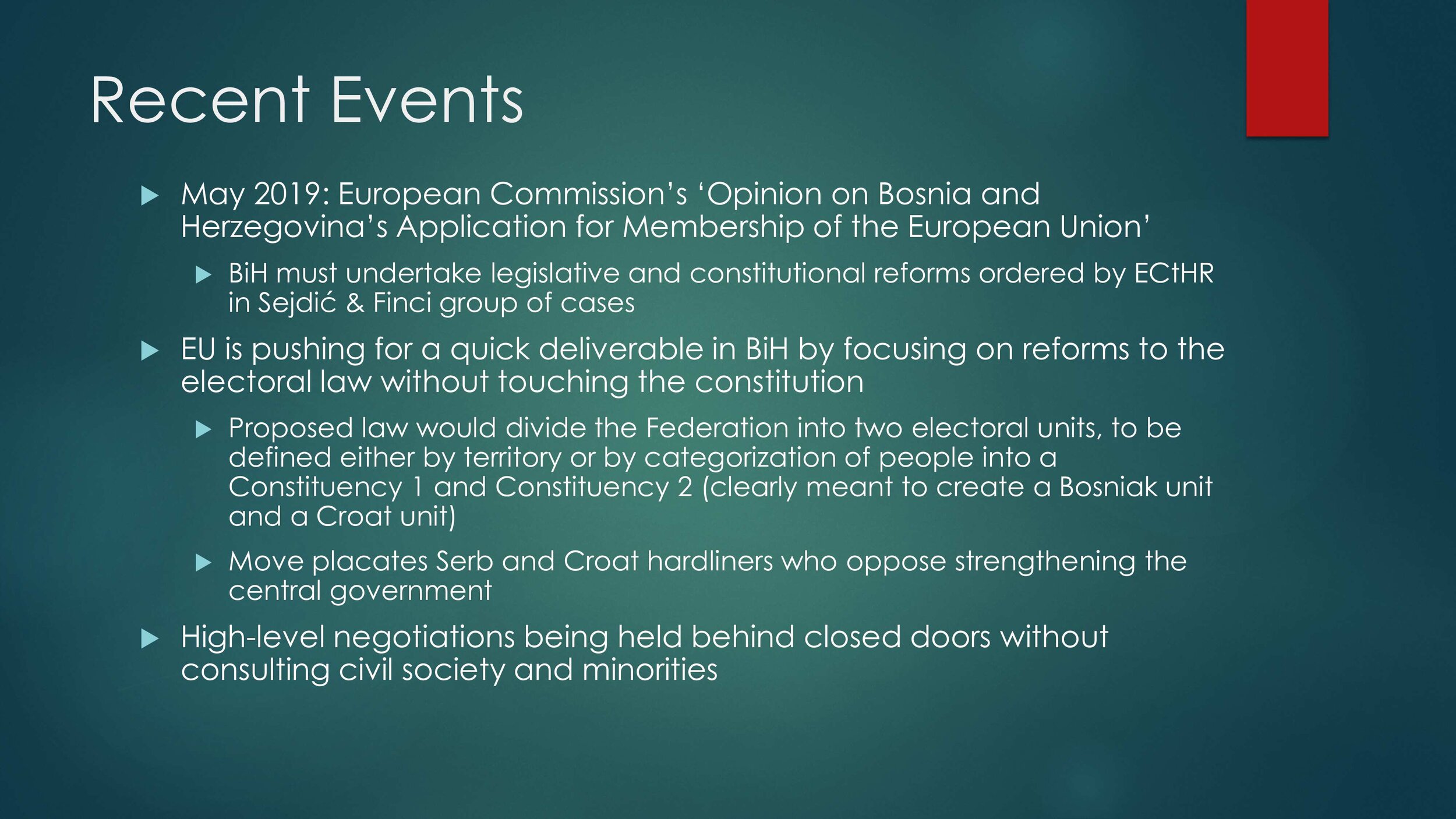
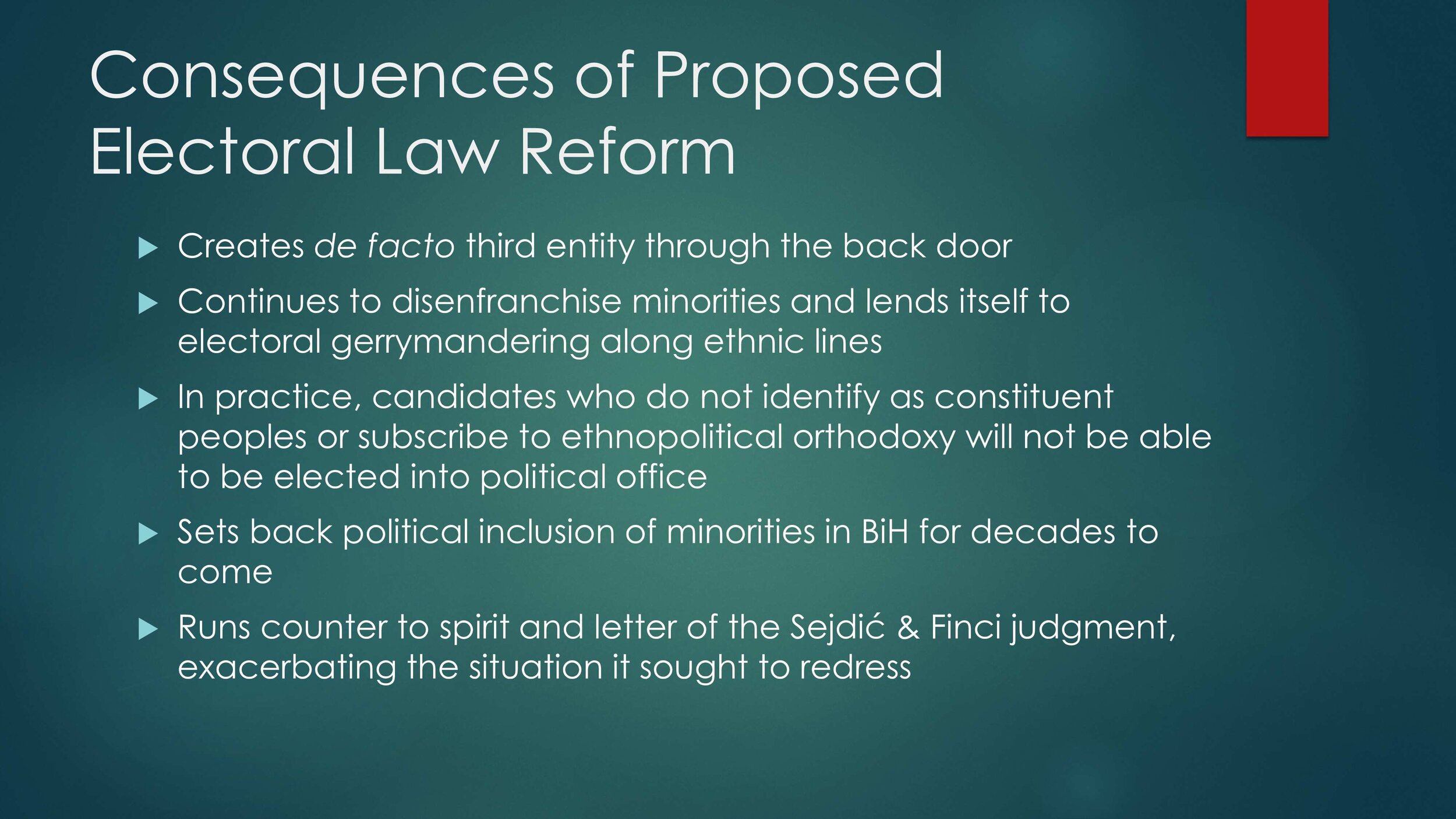
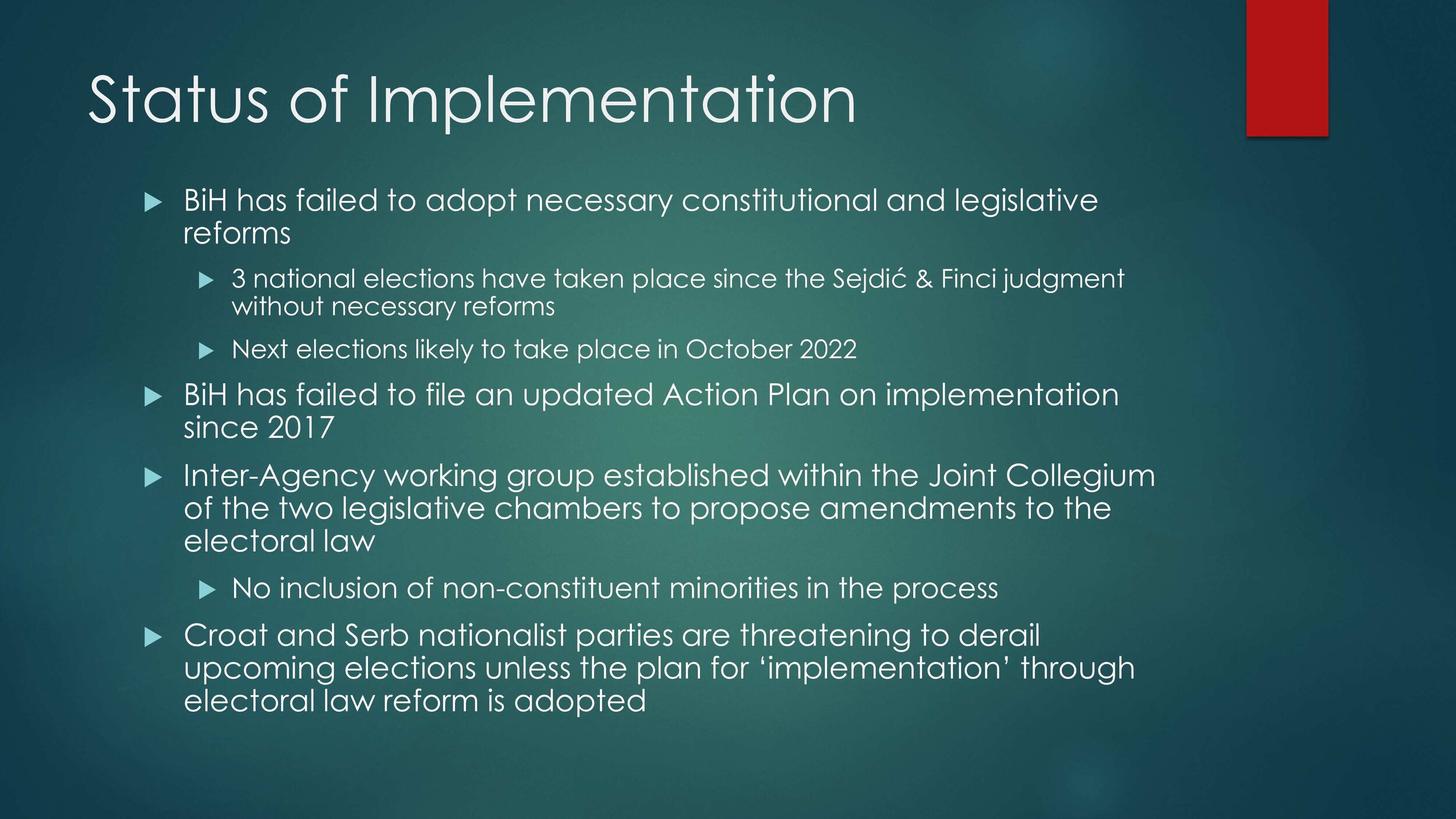
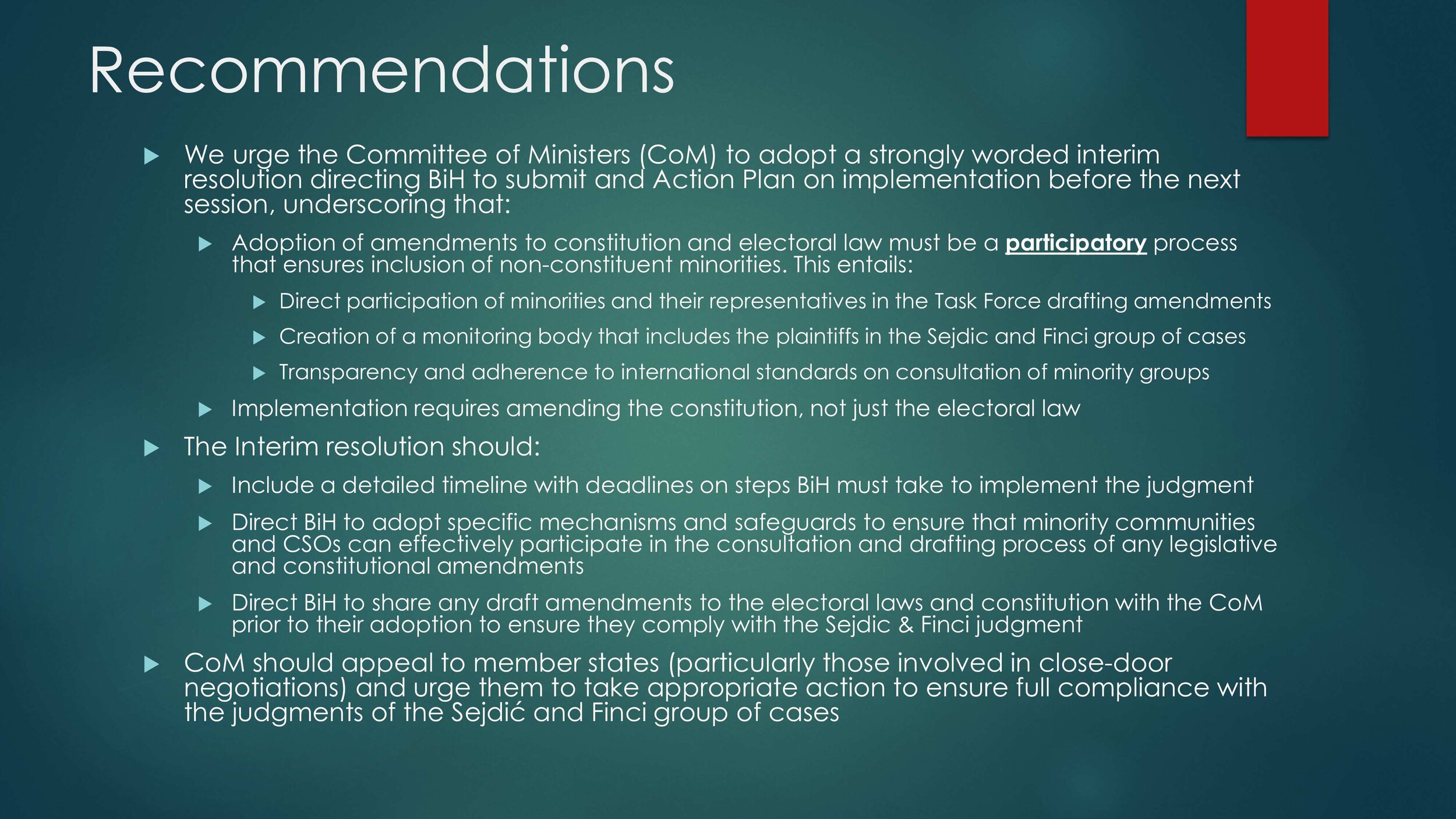
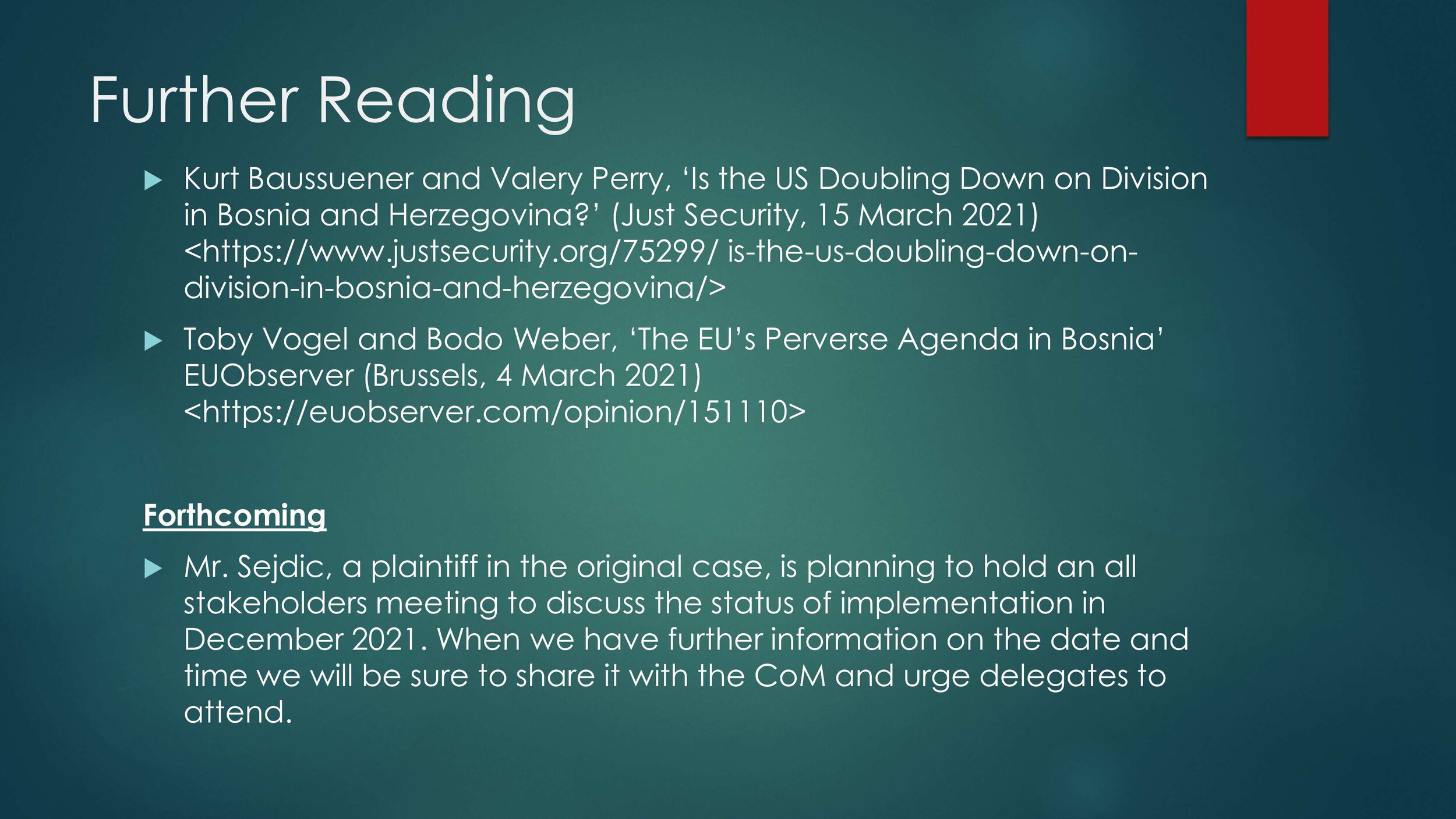
Minority Rights Group International updated participants on recent developments relating to the case:
May 2019: European Commission’s ‘Opinion on Bosnia and Herzegovina’s application for Membership of the European Union’.
BiH must undertake legislative and constitutional reforms ordered by ECtHR in Sejdić & Finci group of cases.
EU is pushing for a quick deliverable in BiH by focusing on reforms to the electoral law without touching the constitution.
The proposed law would divide the Federation into two electoral units, to be defined either by territory or by categorization of people into a Constituency 1 and Constituency 2 (clearly meant to create a Bosniak unit and a Croat unit).
The move placates Serb and Croat hardliners who oppose strengthening the central government.
High-level negotiations are being held behind closed doors without consulting civil society and minorities.
Minority Rights Group International reminded participants of the case’s status of implementation:
BiH has failed to adopt necessary constitutional and legislative reforms.
3 national elections have taken place since the Sejdić & Finci judgment without necessary reforms
The next elections are likely to take place in October 2022
BiH failed to file an updated Action Plan on implementation since 2017
Inter-agency working group established within the Joint Collegium of the two legislative chambers to propose amendments to the electoral law
No inclusion of non-constituent minorities in the process
Croat and Serb nationalist parties are threatening to derail upcoming elections unless the plan for ‘implementation’ through electoral law reform is adopted.
Minority Rights Group International respectfully set forward the following recommendations for the Committee of Ministers:
We urge the Committee of Ministers to adopt a strongly worded interim resolution directing BiH to submit an Action Plan on implementation before the next session, underscoring that:
Adoption of amendments to the constitution and electoral law must be a participatory process that ensures the inclusion of non-constituent minorities. This entails:
Direct participation of minorities and their representatives in the Task Force drafting amendments
Creation of a monitoring body that includes the plaintiffs in the Sejdic and Finci group of cases
Transparency and adherence to international standards on consultation of minority groups
Implementation requires amending the Constitution, not just the electoral law
The Interim resolution should:
Include a detailed timeline with deadlines on steps BiH must take to implement the judgment
Direct BiH to adopt specific mechanisms and safeguards to ensure that minority communities and CSOs can effectively participate in the consultation and drafting process of any legislative and constitutional amendments
Direct BiH to share any draft amendments to the electoral laws and constitution with the CoM prior to their adoption to ensure they comply with the Sejdic & Finci judgment
The Committee of Ministers should appeal to member states (particularly those involved in closed-door negotiations) and urge them to take appropriate action to ensure full compliance with the judgments of the Sejdić and Finci group of cases.
Please see the slides for the full Briefing.
Relevant Documents
Rule 9.2 Submissions
CM Decisions

